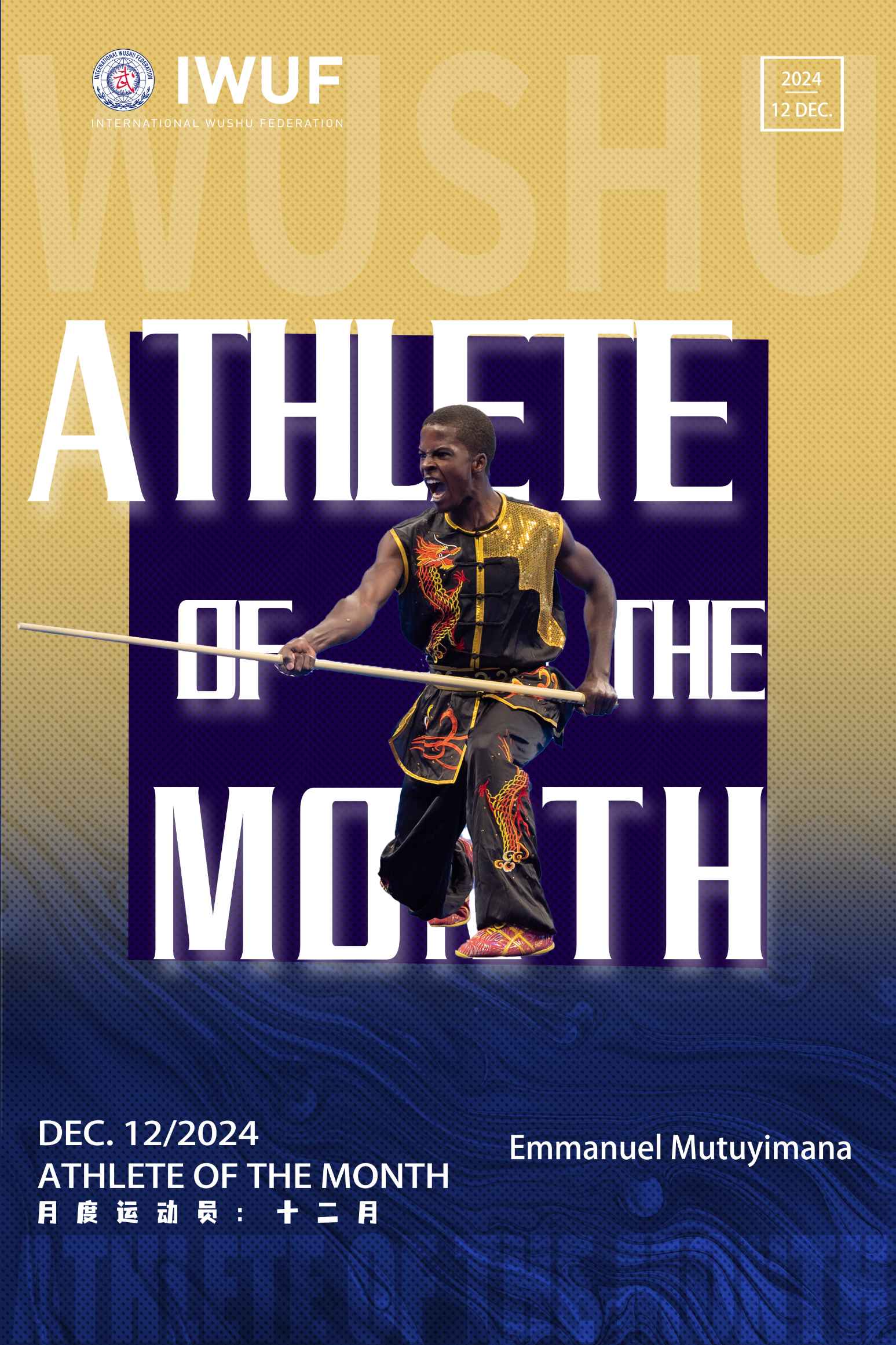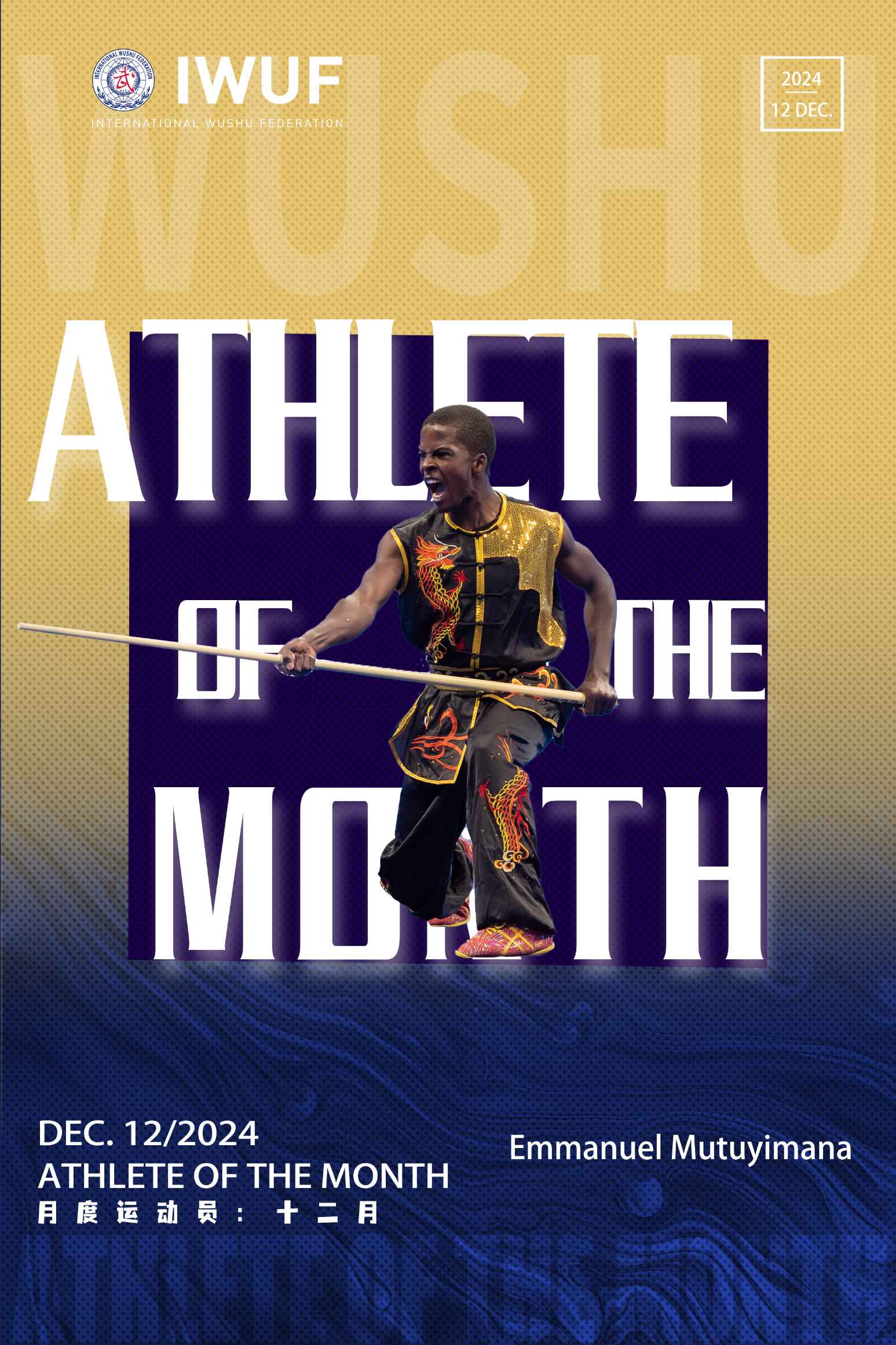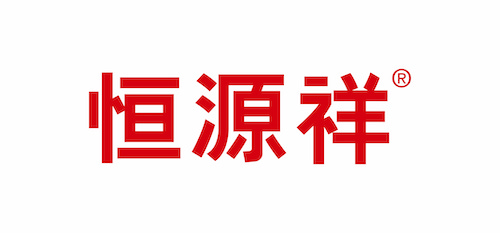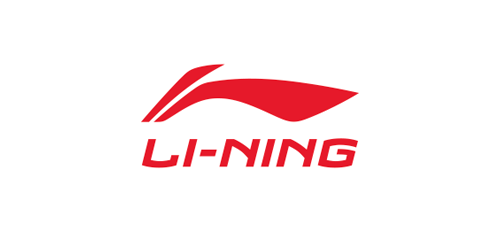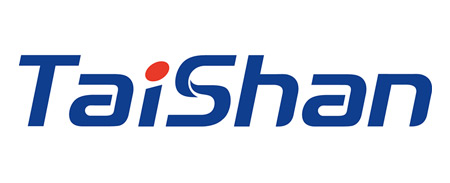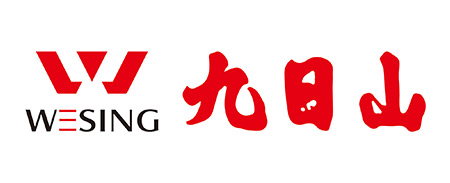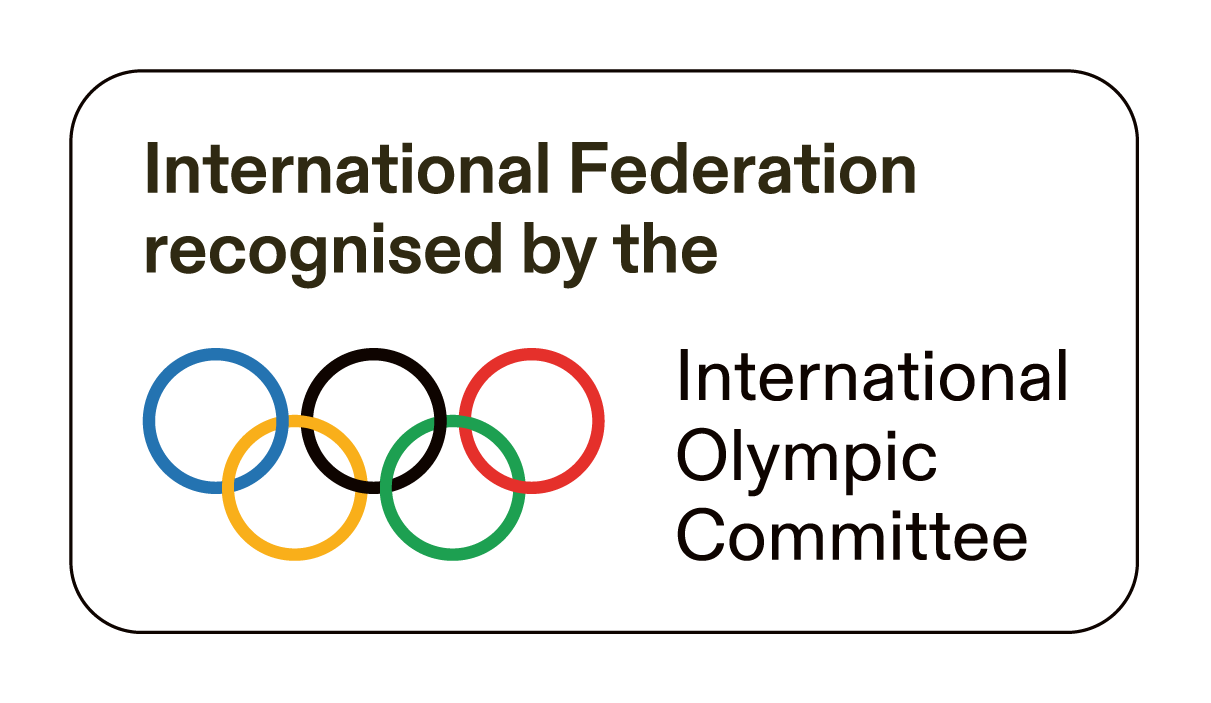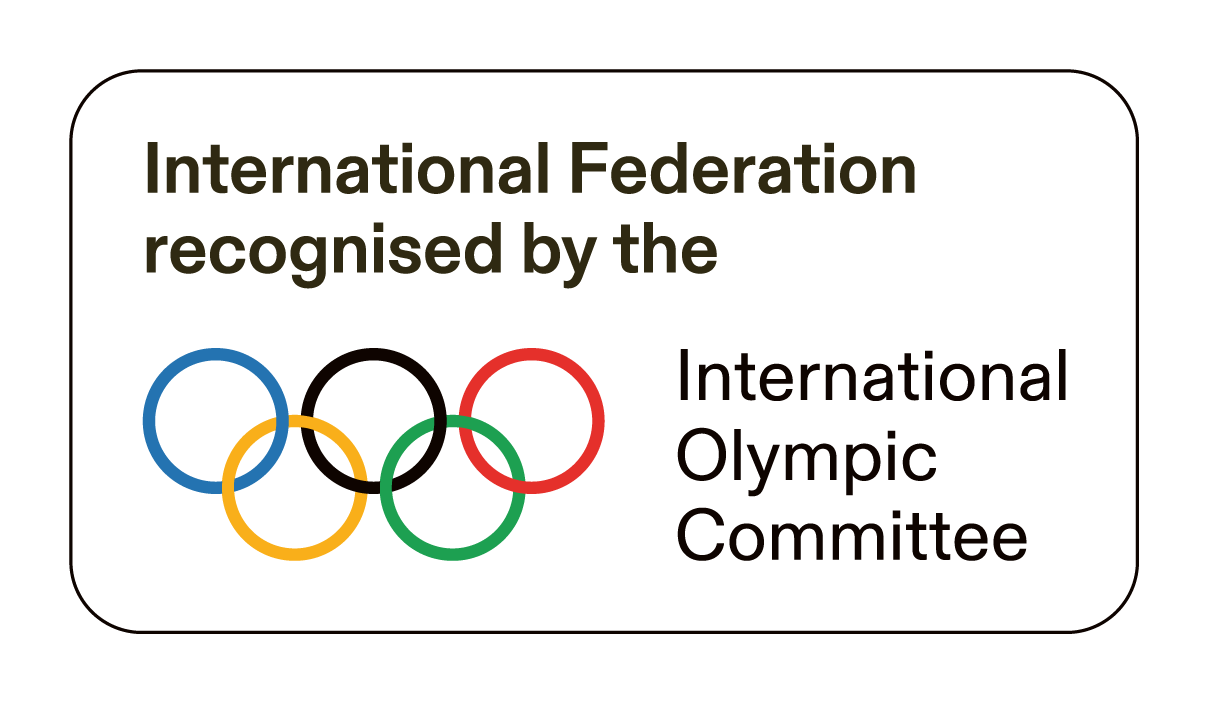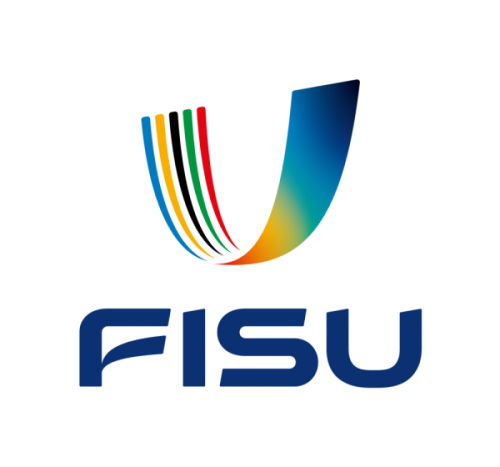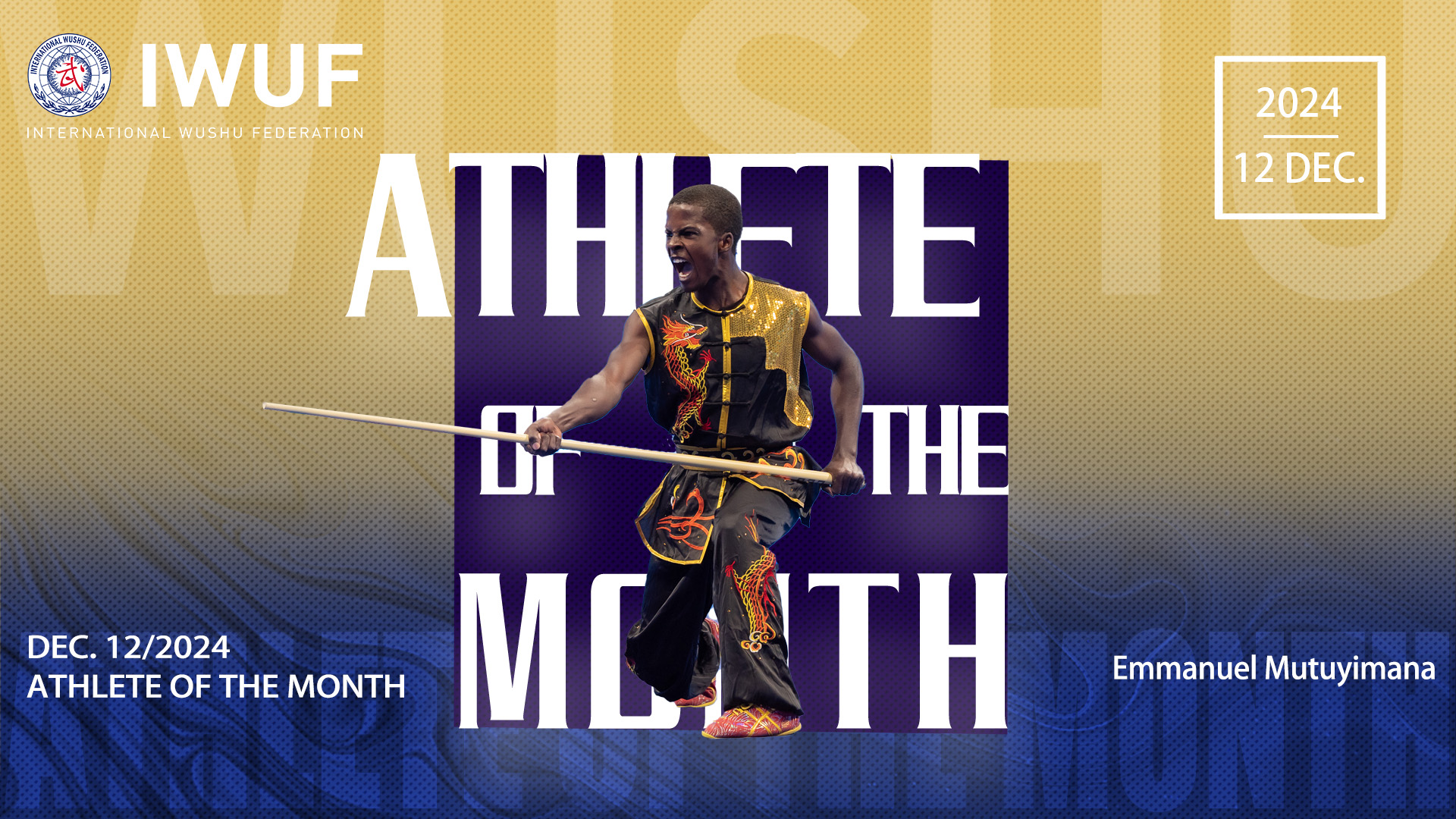
Rwanda’s vibrant rising star athlete Emmanuel Mutuyimana began his wushu journey at age 16. Proudly representing his country, he competed in men’s nangun, nandao, and nanquan at the 2024 International Wushu Tournament Jiangyin. Emmanuel has participated in national competitions since 2018. In June 2023 he attended the African Beach Games that took place In Hammamet, Tunisia and won a third bronze medal in nanquan event. In 2023 he became national champion after winning three gold medals at the Rwandan National Wushu Championship. Alongside his training wushu, Emmanuel is also dedicated to traditional Shaolin kungfu, appreciating the balance the two disciplines offer him in body, mind, and soul. His sharp social media skills have helped him promote wushu in Rwanda and greater Africa on Youtube, TikTok, Instagram and other platforms. His goal is to not only to represent Rwanda as a future international champion, but also to continue his personal and professional growth, and leave a legacy as a coach and mentor by sharing the values of wushu and ensuring it will continue to inspire future generations.
Wushu Beginnings
Emmanuel was born in 2001, in Kigali, Rwanda. Growing up, he says, “I was always fascinated by Chinese movies, especially the martial arts films featuring actors like Jet Li and Jackie Chan. The way they moved and performed these incredible martial arts techniques inspired me, and I wanted to learn how to do those moves myself. I started watching more movies and following social media content related to martial arts, which sparked my interest in wushu. In August 2017, I began practicing wushu at Kigali Kung-fu Shaolin Temple, and it was a real challenge at first. I had no experience, and I struggled with the basic stances like Mabu, Gongbu, and Pubu, etc. Even learning how to punch properly was difficult. My body wasn’t used to the physical demands, and I often felt sore from the muscle strain. But despite the challenges, I didn’t give up. The passion I had for wushu kept me going, and I was determined to improve. It wasn’t easy, but I took it step by step, and as I continued to practice, I grew stronger and more skilled in the art.”
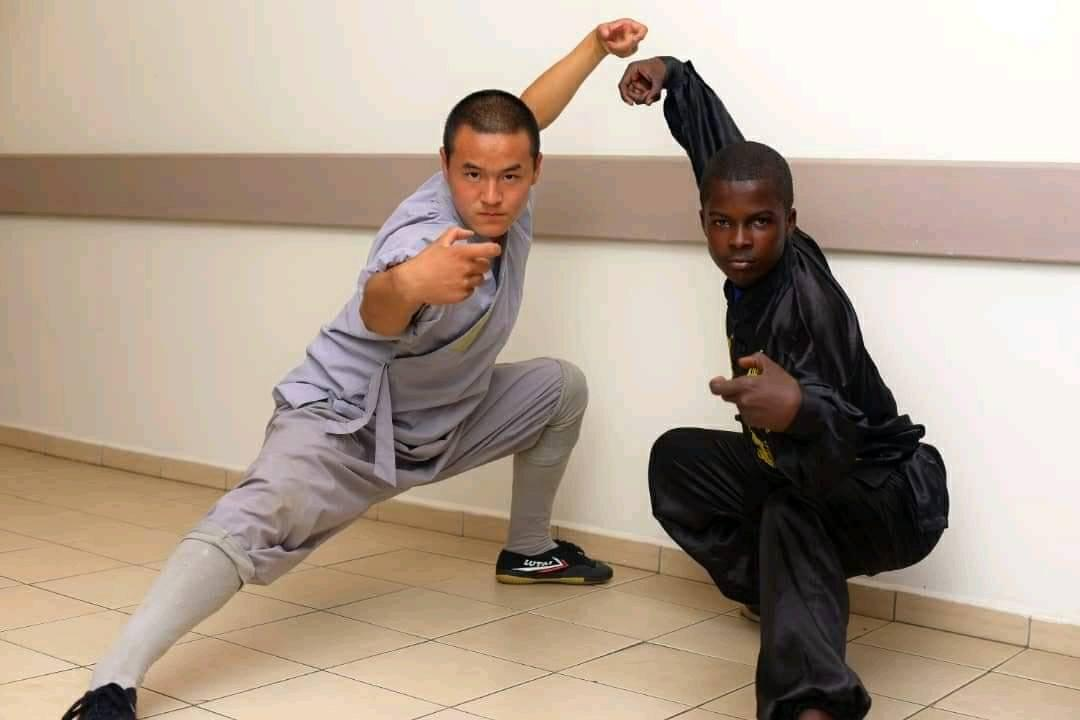
Emmanuel would follow a compelling parallel wushu journey -- pursuing both traditional kungfu and sport wushu -- where he would focus his wushu specialties of nanquan, nangun and nandao. “I appreciate these styles,” he says, “because they each offers unique challenges and emphasizes different aspects of wushu. Nanquan, for example, is dynamic and combines speed and power, which I find exciting. It's all about fluidity and precision in every movement, which I enjoy mastering. Nangun, with the staff, requires not only strength but also coordination and timing, which keeps me mentally engaged. As for nandao, I love how its powerful yet graceful movements blend combat with art. These styles suit me because they align with my personal strengths, like balance, focus, and the ability to adapt quickly. They push me to improve every day and allow me to express myself through the art form.”
First Competition
Shortly after he began to study wushu, Emmanuel would enter his first competition. “I was filled with excitement and nervousness,” he recalls. “It was a huge moment for me, but also quite intimidating. I was a beginner, and I had no idea what to expect. I entered the competition grounds, feeling scared and unsure. I performed my nanquan, but because I was still learning, my movements weren't as sharp as the more experienced athletes. When I received a score of 5.5 out of 10 and no medal, I felt really disappointed. I had put in effort, but it didn’t feel like enough. I remember feeling like I had let myself down, but my coach, always calm and encouraging, told me that this was just the beginning. ‘Maybe today isn't your day, but don’t worry—your time will come,’ he said. That stuck with me, and I decided to not give up. I promised myself that I would work harder, push further, and improve.”Looking back, Emmanuel recalls that the wushu scene in Rwanda back then wasn’t as developed as it is now. “The resources,” he says, “like training equipment and uniforms, were limited, and the competition was still growing. But despite the challenges, there was a strong sense of passion and dedication among the athletes. We were all trying to improve and elevate the sport, even though we didn’t have the same support or resources as athletes in other countries.” What really made him grow, though, he says, “was the encouragement from my coach and the example set by other athletes. I remember watching the more experienced competitors and seeing their flawless technique. They made it look effortless, and that inspired me. I wanted to be like them, to perform at that level of perfection. So, I worked tirelessly to improve my skills, always comparing myself to the best and believing that one day, I too could reach their level. My coach’s constant support and the inspiration from fellow athletes pushed me to continue. It made me realize that growth as an athlete isn’t just about physical strength—it’s about believing in yourself, staying committed, and always striving for perfection, no matter the obstacles.”
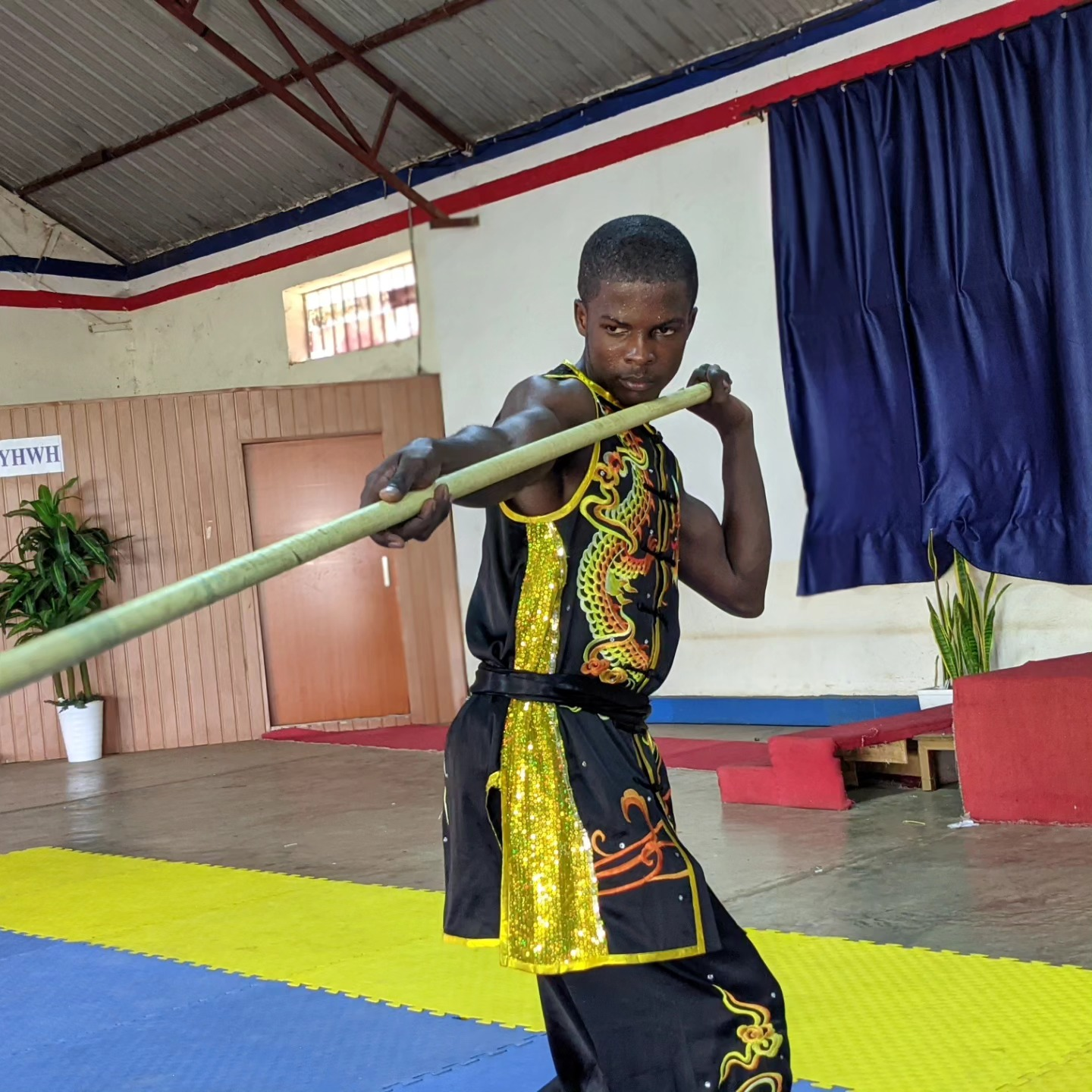
For the next year Emmanuel applied himself assiduously, and in 2018, he returned to the competition scene at Rwanda’s Genocide Memorial Tournament, competing in nanquan again. “This time,” he says. “I performed at my best and earned a silver medal. It was a huge turning point for me—winning that medal showed me that I had the potential to achieve great things if I continued to work hard.”
Joining the Rwandan National Wushu Team
By 2019, Emmanuel would join Rwanda’s National Wushu Team. He remembers, “On December 15th of that year, I competed at the National Wushu Championship and won two bronze medals in the nanquan and nangun categories. This event was a significant moment in my career because it was the competition where I was officially selected to join the national team. It was a proud moment for me, as it marked the beginning of a new chapter in my journey as an athlete.”
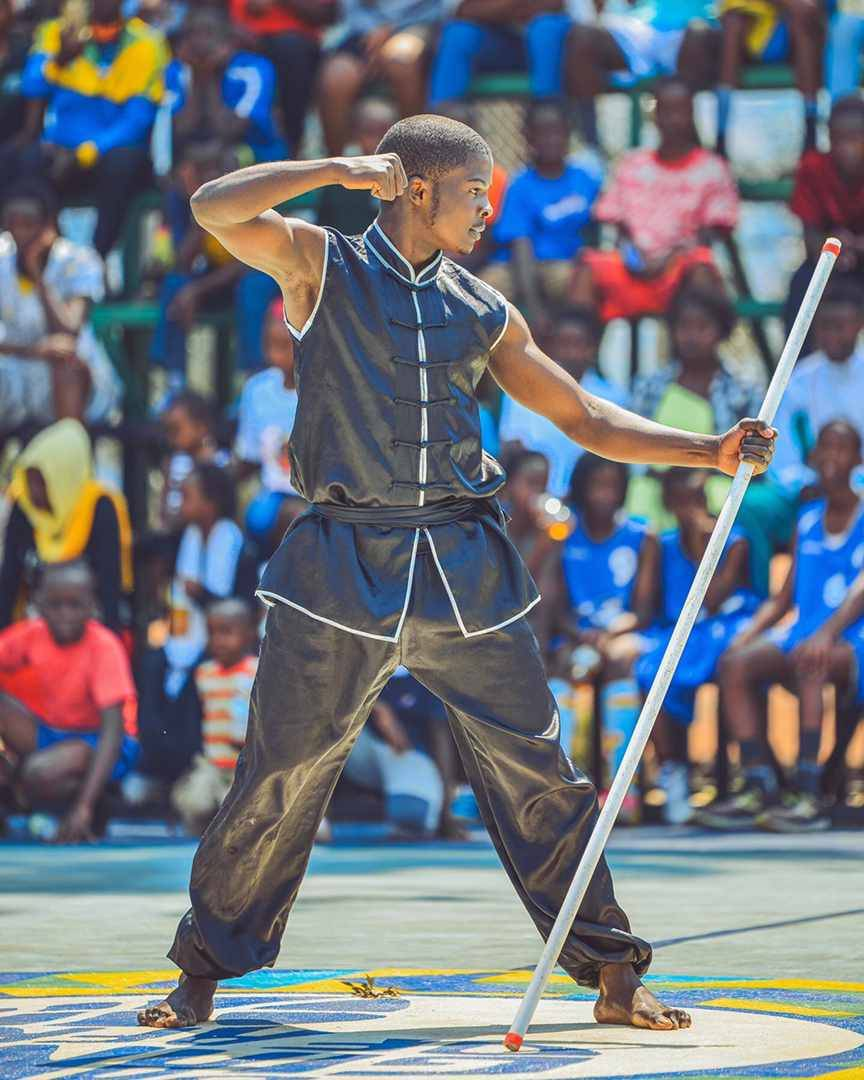
As Emmanuel continued to compete, he gained valuable experience in national competitions. “The level of competition was high,” he says, “and I knew I had to train harder to keep up with the talented athletes. My coach’s encouragement was instrumental in my development. He always reminded me that my time would come, even if things weren’t working out at the moment. This reassurance motivated me to keep pushing forward, even during difficult times.”
Then, in 2021, Emmanuel achieved a major milestone—becoming a national gold medal wushu champion. This victory, he notes, “was a result of years of dedication and effort, and it solidified my place among the top athletes in the country. I felt an immense sense of pride, but I knew that there was more to be done.”
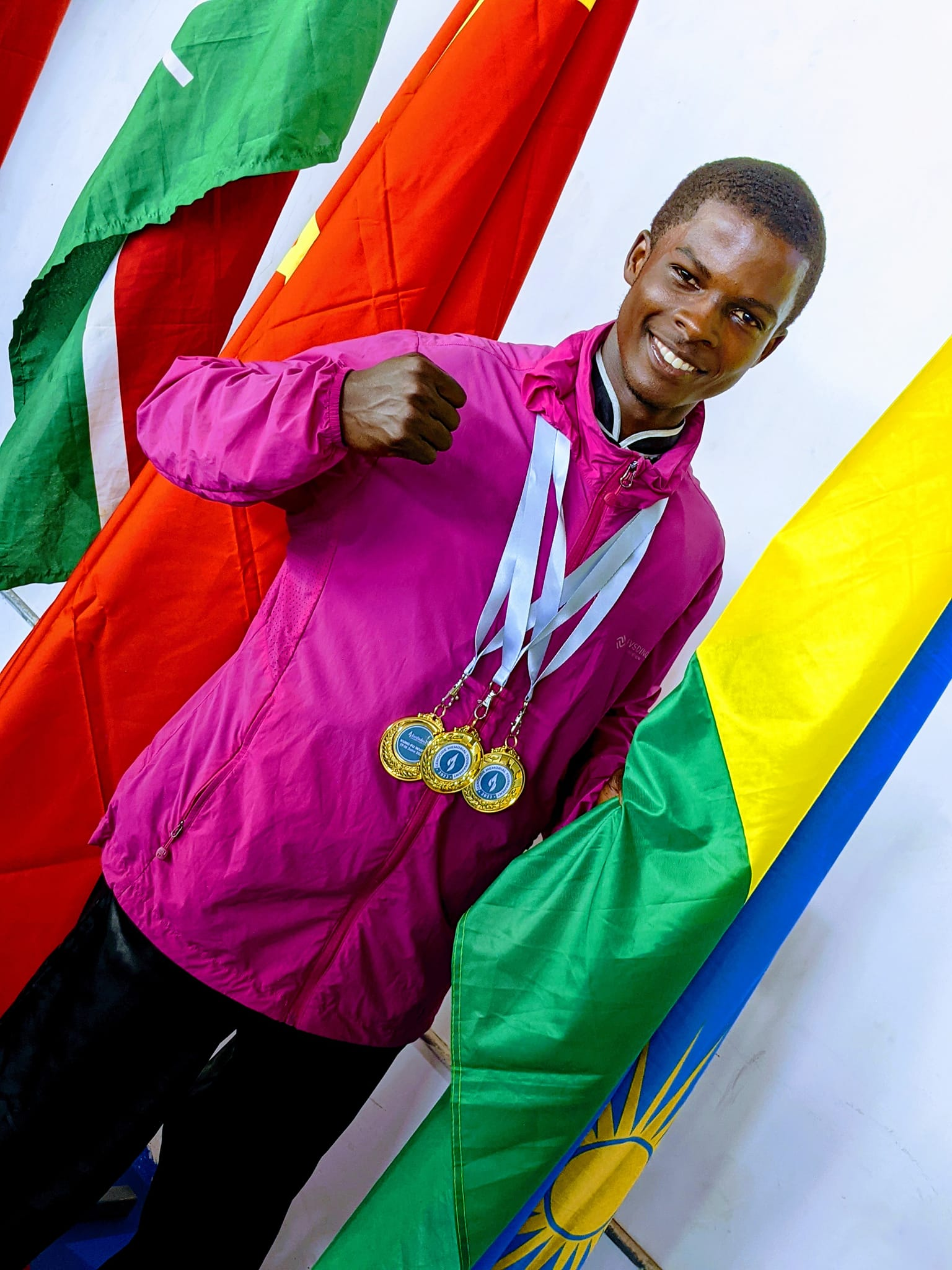
The pinnacle of Emmanuel’s journey came in 2022 and 2023, when he won three gold medals at the Rwandan National Wushu Championship. In 2023 he also won 3 gold medals at the Wushu Genocide Memorial Tournament, a significant event held in Rwanda that brings together athletes from neighboring countries like Tanzania, Uganda, Kenya, and Rwanda itself. Emmanuel says, “It fosters unity while showcasing the incredible diversity of skills and styles across the region. Because the tournament features highly skilled competitors from different backgrounds, it’s known for being a challenging competition that requires participants to be well-trained and disciplined. Winning three gold medals at this prestigious tournament was a defining moment in my career. I was fortunate to secure the gold in three categories: nanquan, nangun, and nandao. Each event presented its own unique challenges, and winning in all three was not just about the medals, but about mastering different aspects of wushu and performing at my highest level. It was a moment of immense pride to see my hard work and dedication rewarded across multiple disciplines. This victory inspired me to continue pushing myself as an athlete and to help further develop wushu in the region.”
Each victory brought with it a renewed sense of purpose for Emmanuel. “The gold medals not only proved my capabilities,” he says, “but also reinforced my responsibility to inspire others. It was a reminder that, no matter where you start, dedication and perseverance can lead to success.”
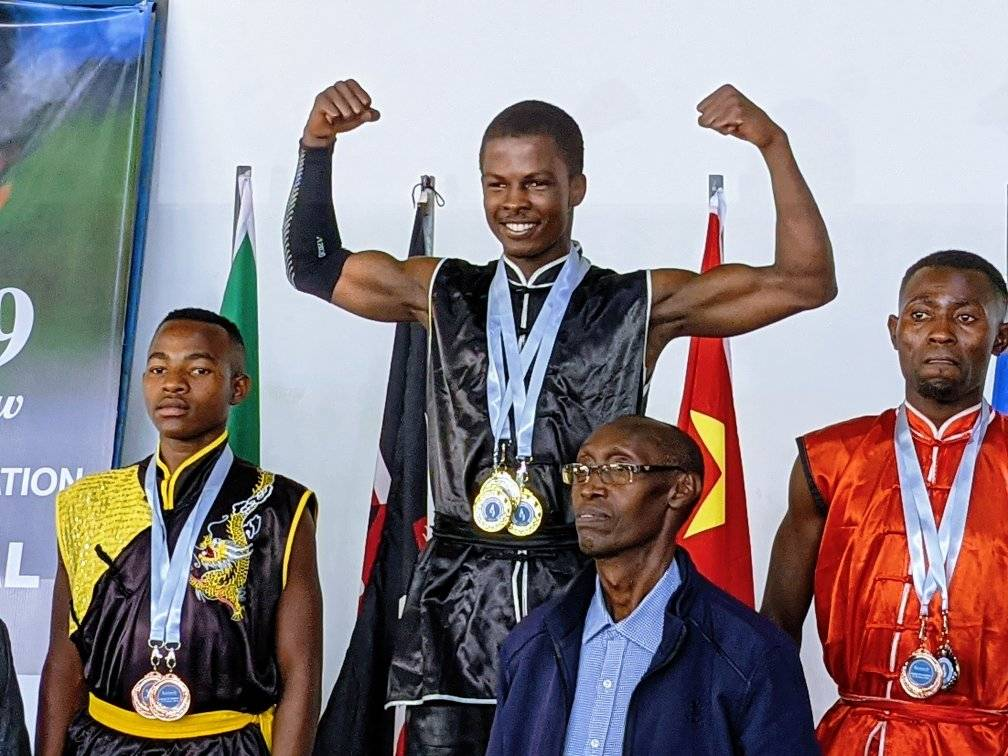
“Leading up to the competition,” Emmanuel recalls, “our preparation was quite intense. For about two months, my coach and I focused mainly on refining my skills in nanquan, nangun, and nandao, which were the core routines I planned to perform. We trained hard, even though we faced challenges with equipment, such as using old nandao swords. Despite these limitations, we remained focused and gave our best effort.”
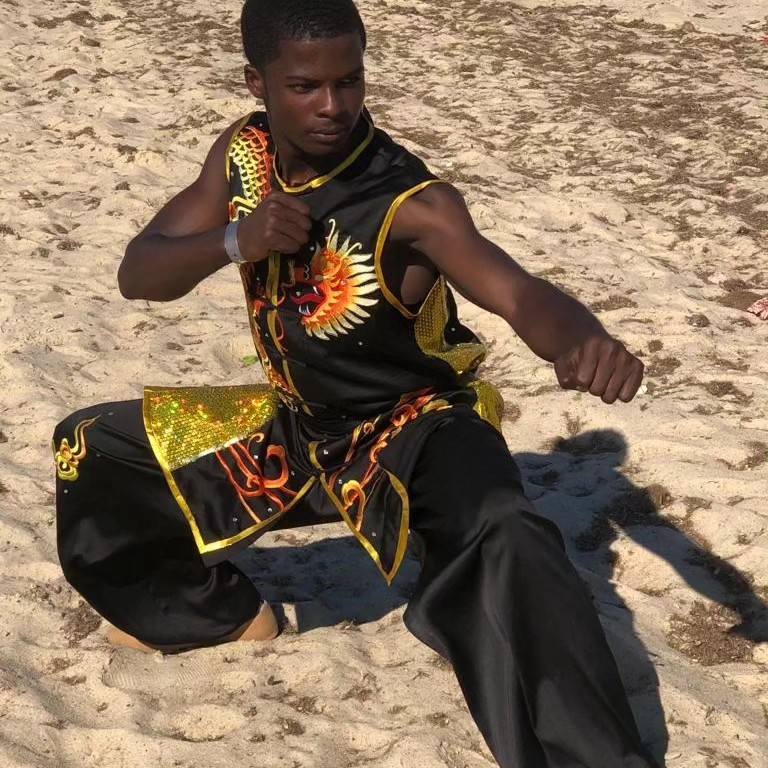
It was also only the second time Rwanda participated in such an event at this level. Emmanuel says, “The country was still in the process of building its experience in international competitions, and we had less exposure to the high standards and rules expected at these events. But our determination to represent Rwanda at the highest level kept us motivated, even though we lacked some of the expertise and resources other nations had.”
The travel itself was its own experience. Emmanuel remembers, “The Rwanda National Olympic and Sports Committee (R-NOSC), the Minister of Sports, and the Chinese Embassy all played significant roles in ensuring we could travel smoothly for the competition. They handled the logistics, from securing our tickets to providing support while we were there. Fidel, a representative from the R-NOSC, accompanied us and was instrumental in ensuring everything went well during our stay.”
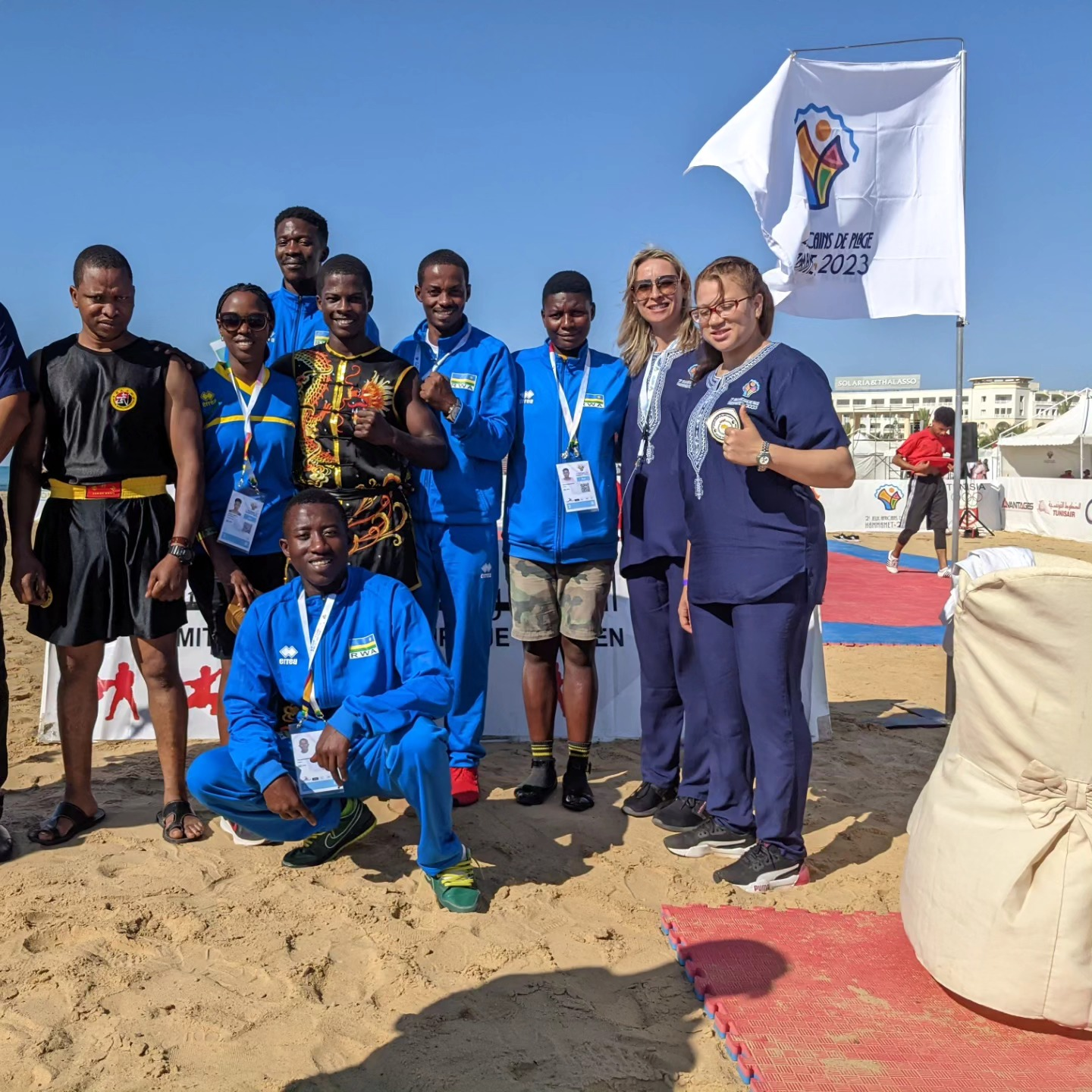
“Once we arrived in Tunisia,” he continues, “the heat was one of the biggest challenges. The climate was far hotter than what we’re used to in Rwanda, with intense sunshine and high temperatures. It was quite difficult to adjust, especially during training and competition days. Additionally, food was another challenge, as the cuisine was very different from what we are familiar with, and it took time to adapt to the meals.”
Emmanuel adds, “Language was another hurdle, as most of the people there spoke Arabic. Although I knew a bit of Arabic, communicating was still tough. However, I managed to adapt and made an effort to communicate with people using what little Arabic I knew. It wasn’t easy, but I made it work, and I’m grateful for that experience.”
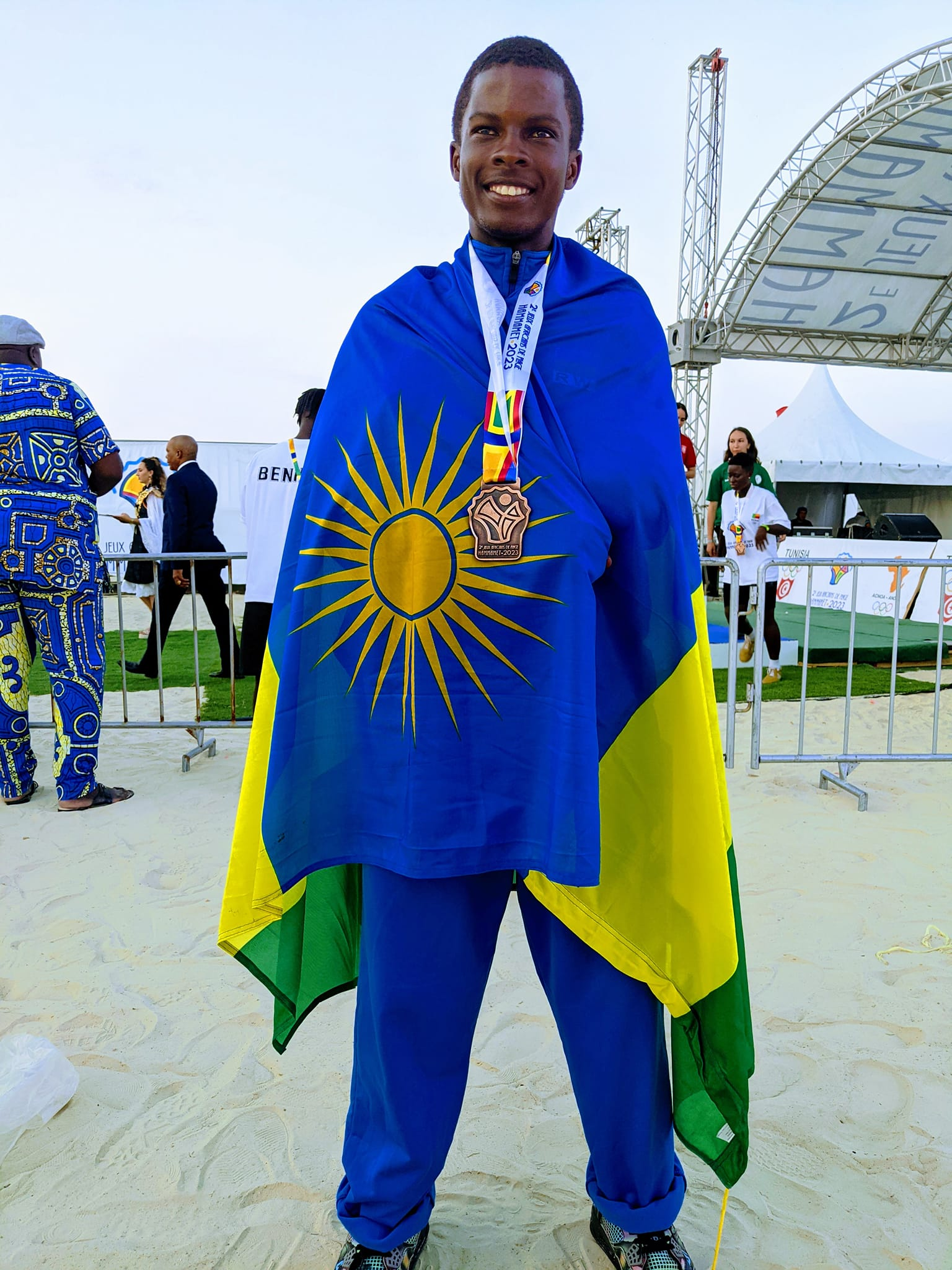
The competition itself was a challenge, with many talented athletes from all over the continent, but Emmanuel managed to win a bronze medal in nanquan. “When I reflect on my performance,” he says, “I feel a mix of emotions. The competition was tough, and I didn’t place as high as I had hoped, but I’m proud of how I handled myself under pressure. It was my first time competing on such a large stage, and despite the challenges, I gave it my all. There were areas I could improve, particularly with handling the environment, adapting to the pressure, and fine-tuning my techniques for international standards.”
He adds, “Overall, this competition was a valuable learning experience. It was the second time Rwanda participated in such an international competition, following the 2019 World Wushu Championships, and I’m proud to have been part of this progress. The experience will guide me in future competitions, and I’m more determined than ever to keep improving and represent my country with pride.”
Career Milestone in China -- 2024 International Wushu Invitational Tournament
As a rising star in Rwanda wushu, Emmanuel has participated in two significant international tournaments. “My first international competition,” he reiterates, “was the African Beach Games in Tunisia, where I represented Rwanda in wushu for the very first time. The second international competition I participated in was the 2024 International Wushu Invitational Tournament in Jiangsu, China. This event was a milestone in my career, as I had the opportunity to compete at the highest level against top athletes from around the world.”
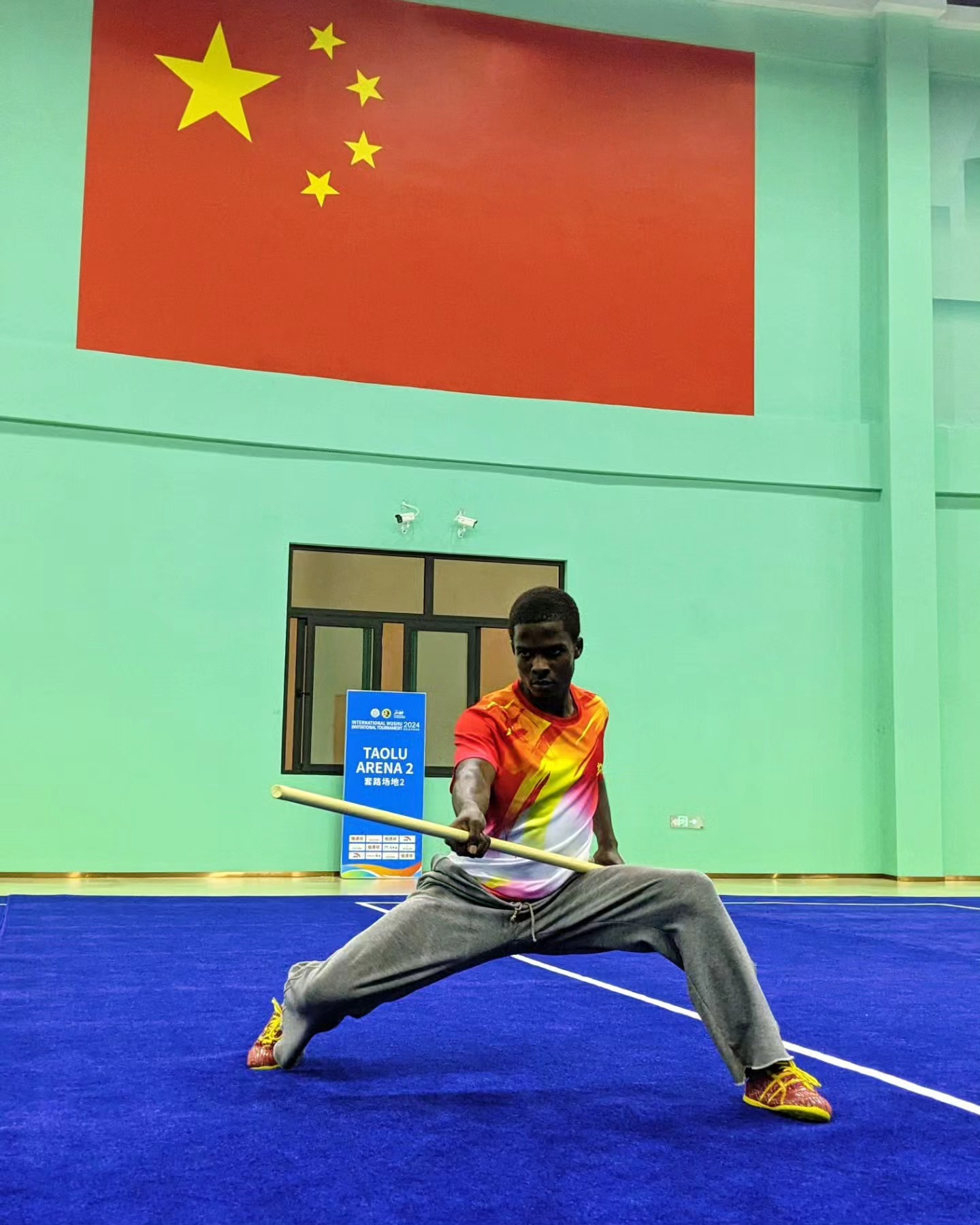
“We traveled as a small team,” Emmanuel recalls. "Just four of us: two athletes (myself and another athlete), one coach (Godfrey), and Marc, the President of the Federation. Our arrival in China was challenging, as most people there primarily speak Chinese and not much English. Fortunately, I had learned a bit of Chinese, so we tried to manage the communication by speaking some basic phrases, and it went well overall. The weather was another challenge. Coming from a warm climate in Tunisia, China was much colder, and we had to bundle up with jackets, even in the mornings and evenings.”
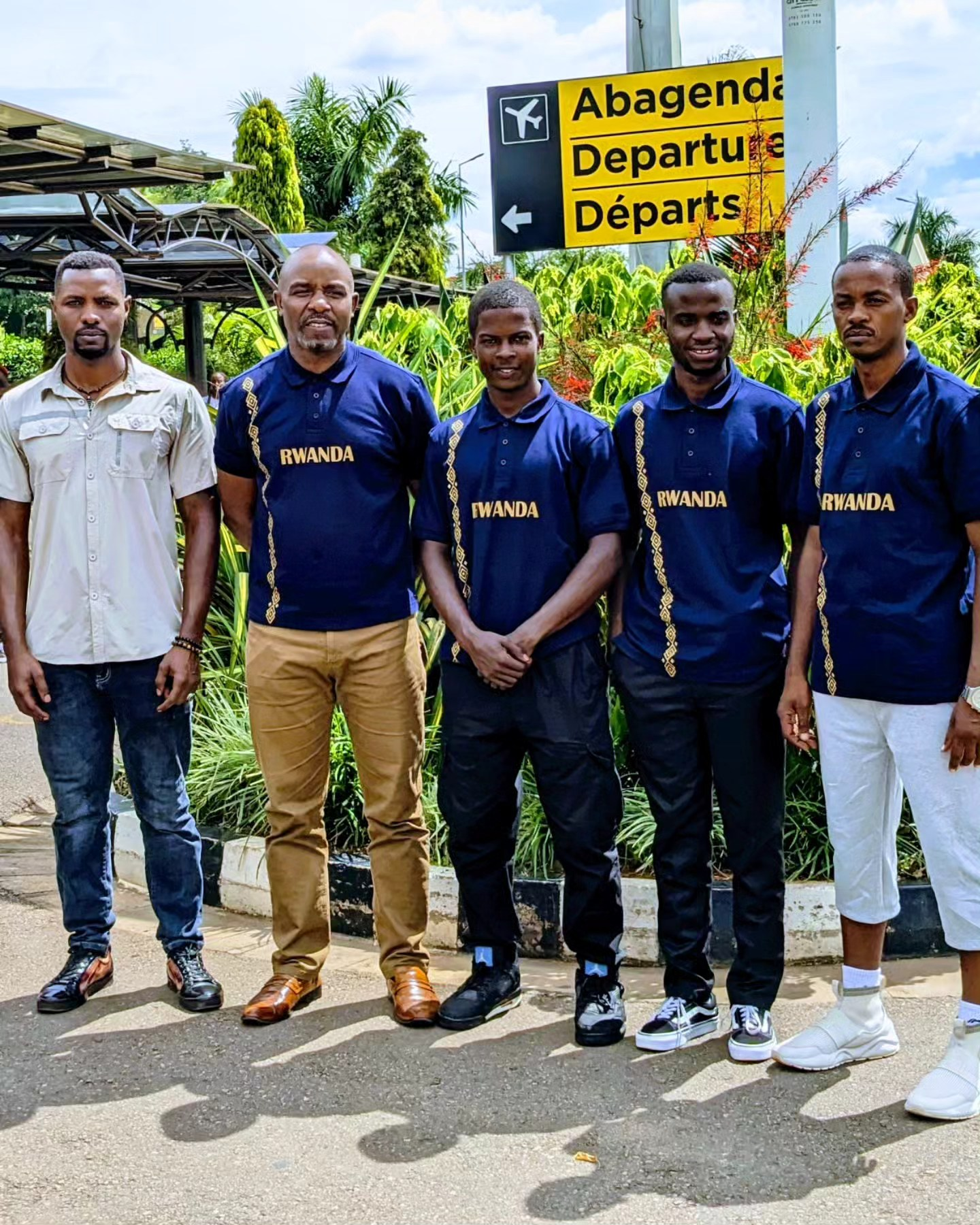
Emmanuel says that the experience of the Jiangyin event overall was one of growth, both as an athlete and as a person. “Competing in nanquan, nandao, and nangun,” he says, “gave me the opportunity to see where I stood against the best. I learned a lot from my competitors, especially in terms of technique and performance under pressure. It inspired me to keep pushing myself and improving. As for the individual competitions, nandao was my favorite. The flow of the movements felt the most natural for me, and I felt that I could really showcase my skill in that form. Competing alongside such talented athletes reminded me of how much more I can push myself, and it inspired me to work even harder, refine my skills, and set higher goals for my future competitions. This experience has definitely motivated me to continue improving and to aim for the highest level of success in wushu.”

Training and Traveling with Rwanda Wushu Team
Emmanuel says that training and traveling with the Rwanda Wushu team has been an incredible experience. “The training sessions are intense, and we always push each other to perform at our best, whether it’s in technique, strength, or stamina,” he says. “During these sessions, the sense of camaraderie is strong, and everyone is focused on improving. We always encourage each other, share tips, and make sure we’re on the same page to ensure that we’re all ready for competitions.”
He adds, “When it comes to traveling for events, the team is supportive both mentally and logistically. Whether it’s working through travel arrangements or managing the stress of competition, we always make sure no one is left to handle things alone. We share the highs and lows together, and that makes the whole experience more enriching. It’s a team effort in every sense, and the success of each individual reflects the unity and hard work we’ve all put into our training. The bond we have is truly special, and it’s a big motivator to continue representing Rwanda with pride.”

Two Paths -- Sport Wushu and Shaolin Kungfu – A Parallel Journey
The various origin stories of wushu’s worldwide diaspora are fascinating and unique, and the Kigali Kung-Fu Shaolin Temple is no exception. As Emmanuel tells it, it all began in 1982 when a group of Chinese workers came to Rwanda for construction of Kimisagara Road in Kigali. A local construction worker called Simbizi Emile witnessed his fellow Chinese workers practicing some kungfu, and he became Interested in learning from them. After the Chinese workers returned to China, Emile’s kungfu journey continued; one of his students, Ndizeyemanzi Bosco (AKA Master Koko), founded the Kigali Kung Fu Shaolin Temple in 1997 at Youth Club Rafiki, Kigali. Master Koko’s student, Hakizimana Shafi became the head of the Kigali Kung Fu Shaolin Temple and continued teaching and managing the club.
“I became involved with the Kigali Kung Fu Shaolin Temple in August 2017,” says Emmanuel, “when I started training there under Master Shafi’s guidance. He welcomed me warmly and began teaching me from the very basics. To this day, I’m still under Master Shafi’s mentorship, and he continues to lead the temple, ensuring the growth and development of kungfu in Rwanda.”
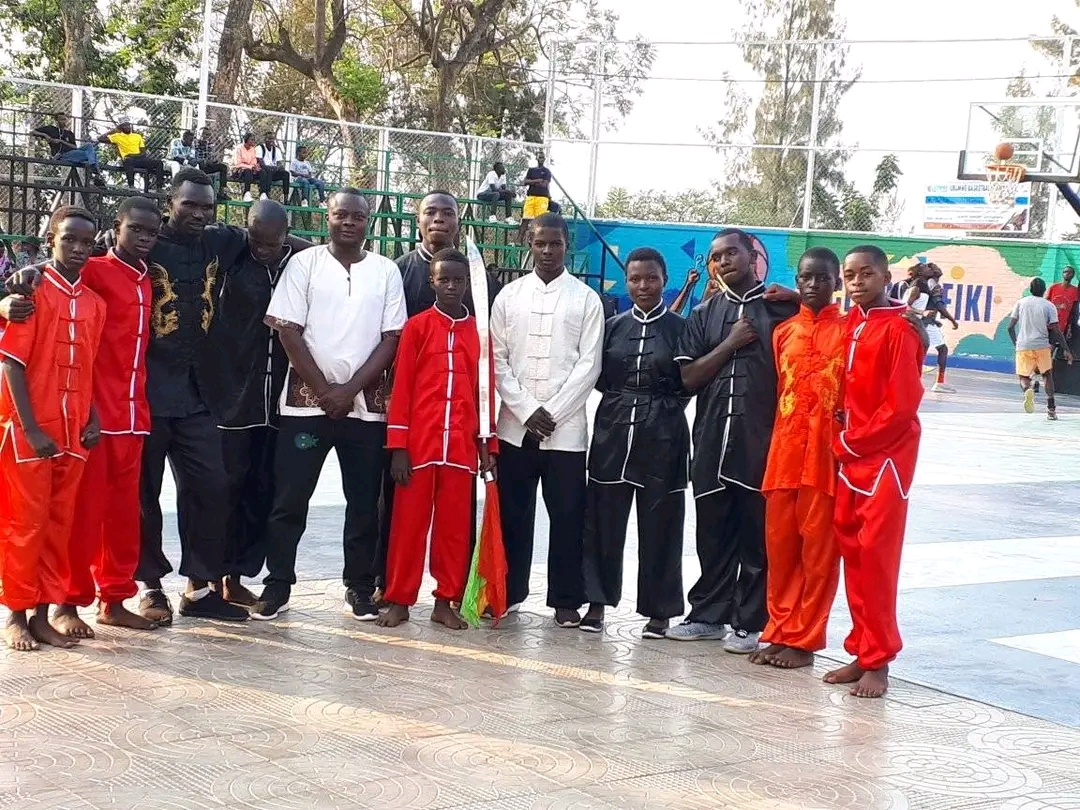
Emmanuel practices traditional Shaolin kungfu at his club, Kigali Kung Fu Shaolin Temple, but notes, “While our club carries the name ‘Shaolin Temple,’ we don’t have the large temple structures like those in China. Instead, we practice at a youth center, but the name reflects our deep connection to the Shaolin spirit.”
“Wushu,” he also emphasizes, “has been more popular than Shaolin kungfu in Kigali due to the lack of seminar training and competition opportunities for Shaolin styles. Most of our training is in sport wushu because it has received more attention here. However, in 2024, we had our first official Shaolin seminar, where we learned techniques like Shaolin Guiding quan, Shaolin qixing quan, and Chen-style taiji. This was an important milestone in bringing more attention to Shaolin Kungfu in our practice.”
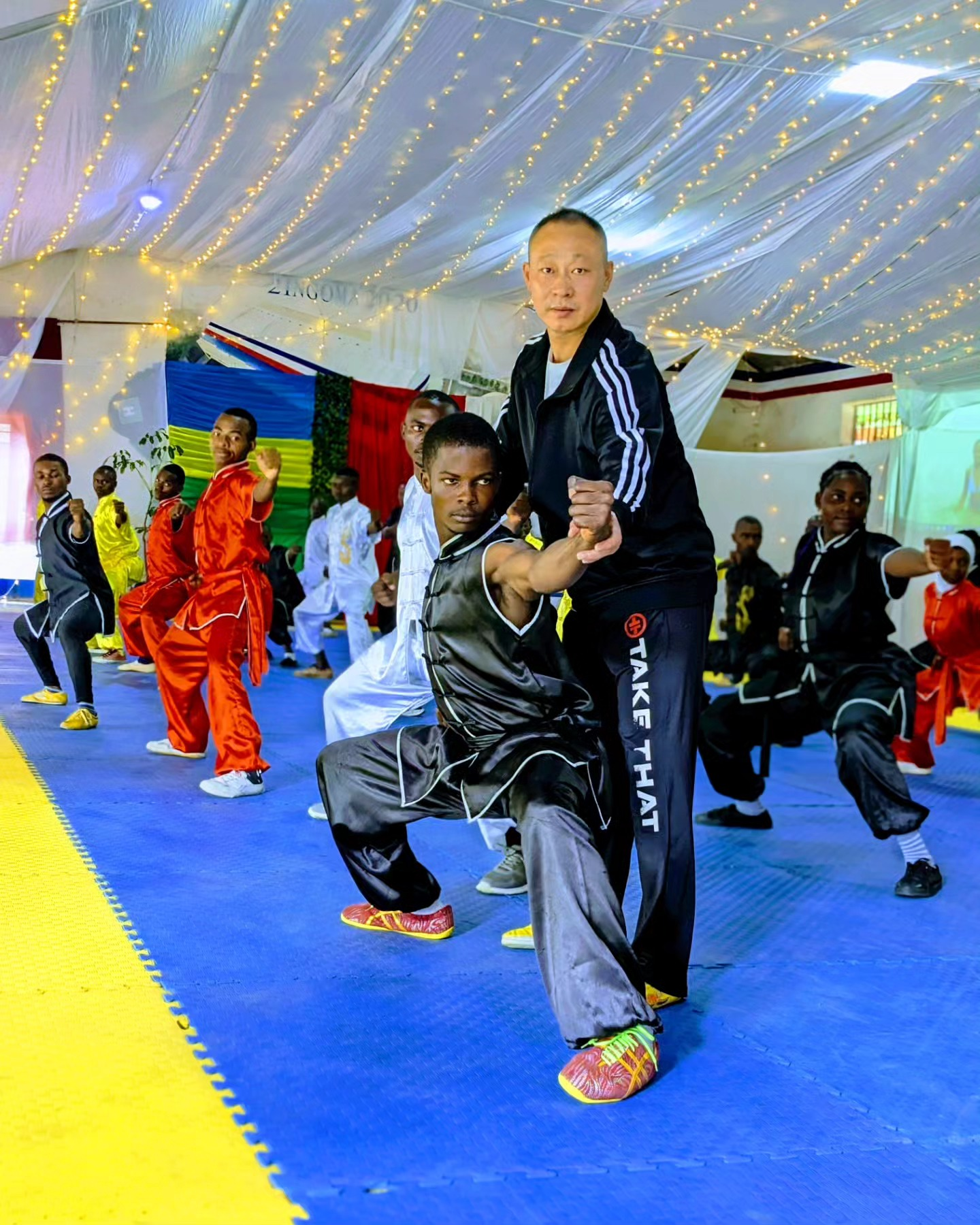
“Moving forward,” Emmanuel adds, “we are committed to improving the reach of traditional Shaolin Kung Fu. We are willing to have more seminar training opportunities in Rwanda, and we also aim to establish Shaolin Temples here to contribute to the development and growth of traditional Shaolin Kungfu. This will not only help us grow but also promote the art to a wider audience. We are also considering traveling to China for further training. In 2025, we will begin competing in both wushu and traditional Shaolin kungfu. Our goal is to balance the two styles, giving equal focus to both and helping to promote Shaolin kungfu alongside wushu in Rwanda.”
Wushu vs. Traditional Kungfu – A Perfect Balance
“In Rwanda,” Emmanuel states, “wushu has been the dominant martial art for a long time, and it is what I've primarily trained in, having more exposure to its competitive aspects. Wushu, being a performance-based martial art, emphasizes acrobatic skills, speed, and precision, focusing heavily on high kicks, fluid movements, and visual presentation for competitions. The rigorous training in wushu has helped me develop agility, strength, and flexibility, making it a significant part of the martial arts culture here in Rwanda.”
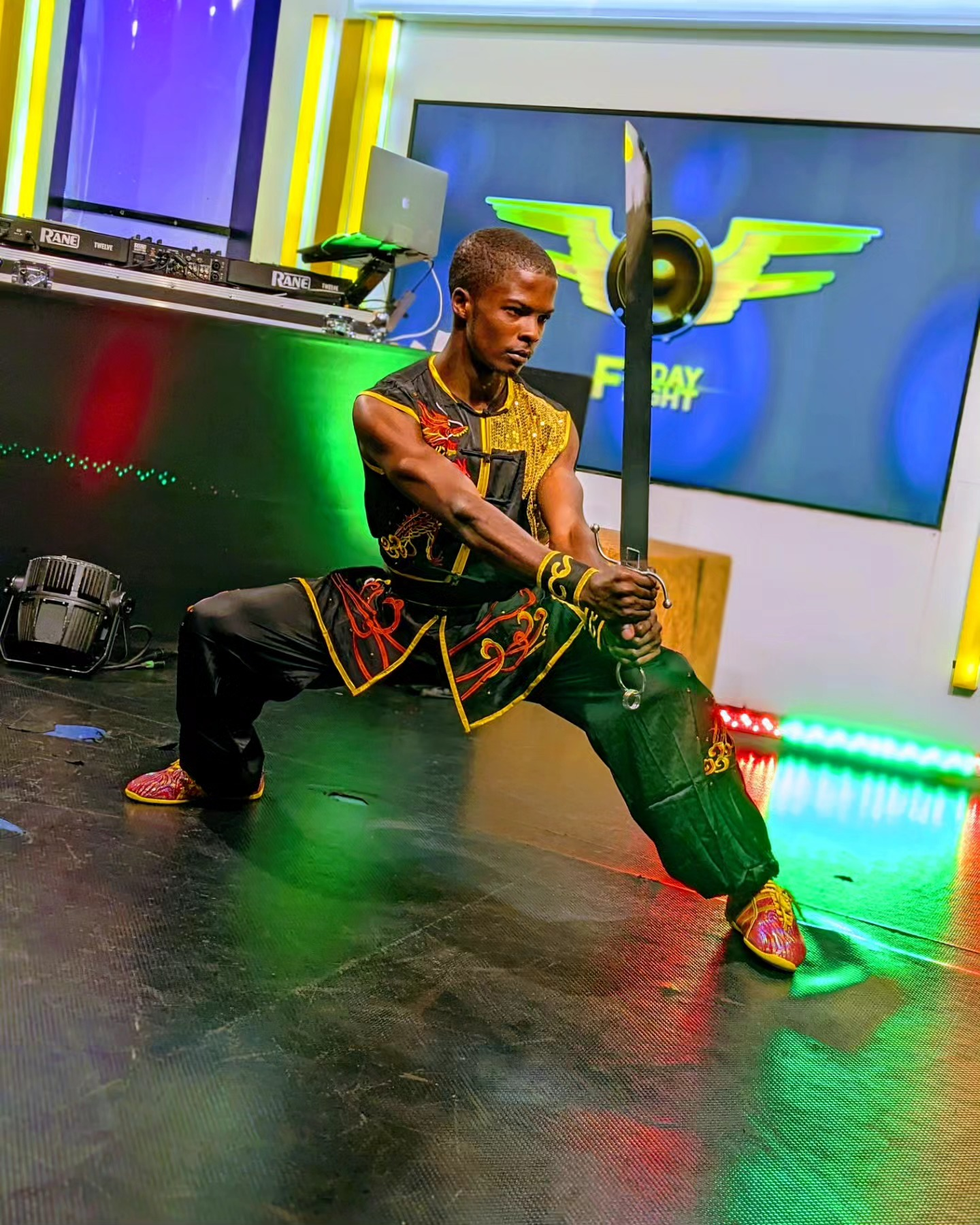
“However,” he adds, “in 2024, we began formally integrating traditional Shaolin Kungfu into our training. Shaolin Kungfu has a deep-rooted connection to Chinese culture and history, emphasizing internal strength, mental discipline, and spiritual development. While my experience with Shaolin Kungfu is still growing, it’s clear that its approach is more methodical, requiring a strong foundation in basic stances and movements before progressing to more advanced techniques. It is less focused on performance and more about personal growth, discipline, and understanding the philosophy behind the martial art. As someone who has trained primarily in wushu, I’ve come to appreciate how Shaolin Kungfu challenges me to slow down, be more mindful, and cultivate inner peace, as opposed to the fast-paced, visually-driven nature of wushu training.”
He adds thoughtfully, “Although I haven’t had extensive experience with traditional kungfu, I see great value in how both styles complement each other. The integration of both martial arts allows me to evolve not only as a fighter but as an individual who can better understand the philosophy and spiritual side of kungfu. Moving forward, I aim to deepen my understanding of Shaolin Kungfu, knowing it will enrich the skills I've developed through wushu, and help me achieve a more holistic approach to martial arts.”
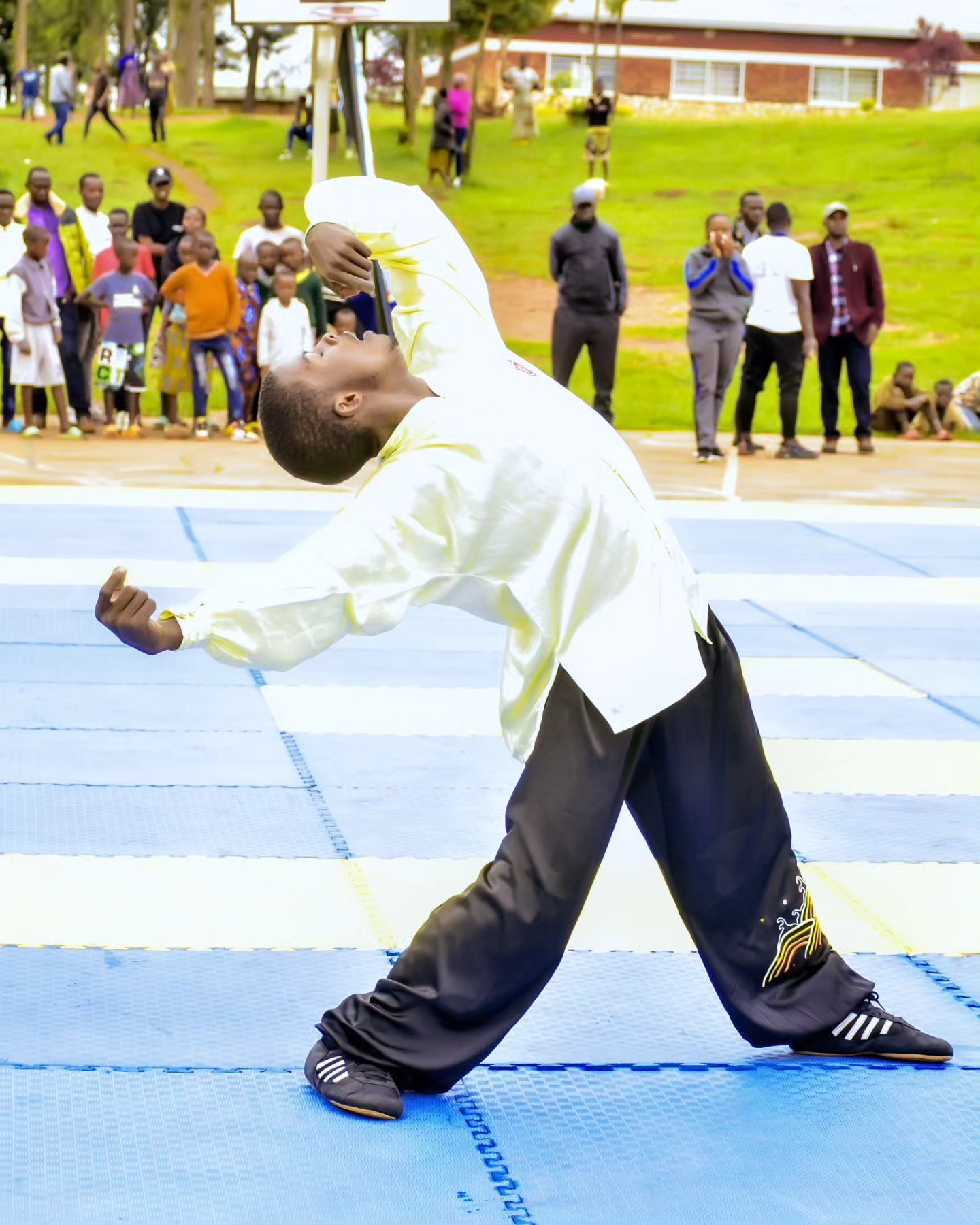
Biggest Rewards and Challenges of Wushu
We asked Emmanuel about the biggest rewards and challenges of his wushu career. “The best part of being a wushu athlete,” he replies, “is the opportunity to challenge myself both physically and mentally while representing my country and its values on national, African, and international stages. National Rwandan competitions have allowed me to connect with local athletes, fostering a sense of unity and pride. On the African level, the spirit of continental camaraderie and the high level of competition push me to improve constantly. Internationally, competing with athletes from diverse cultures broadens my perspective and inspires me to strive for global excellence. Additionally, I respect the cultural diversity among my fellow athletes. Each of us comes from different backgrounds, and appreciating and understanding these differences has strengthened our relationships. At the end of the day, it’s the shared passion for kungfu and wushu that continues to bring us together and maintain our friendships.”
He adds, “The most rewarding aspect of wushu is the personal growth it brings, from learning discipline and perseverance to embracing the values of sportsmanship. Beyond medals, it’s about the journey of self-improvement and the ability to inspire others through my craft.”
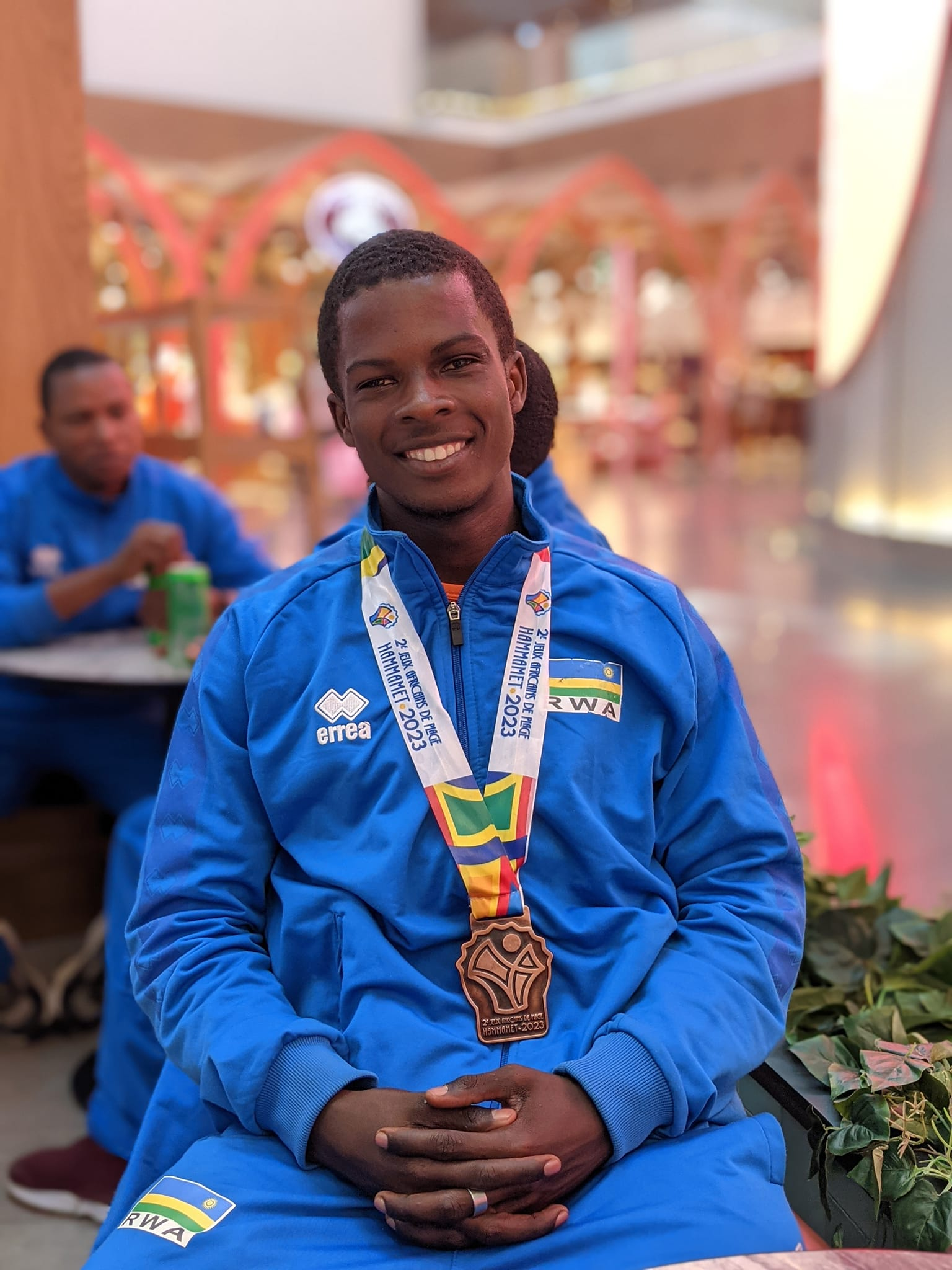
Reflecting on challenges in his career, Emmanuel says, “One of the biggest challenges I faced in wushu was when I was selected to represent Rwanda at the African Beach Games in Tunisia. At the time, I had not been training as much as I should have, since I was caught up in other activities. When I found out I was going to represent my country, I was overwhelmed with self-doubt. I feared that I wasn't prepared enough and that I might disappoint my country and the trust that had been placed in me. I was scared because it was my first time going abroad to represent my country, and I wasn’t sure if I was ready for the competition.”
“But,” he adds, “instead of letting fear take over, I decided to work harder. I increased my training time three times more than usual to make up for the time I lost. My coach was incredibly supportive during this period, offering advice and guidance to help me prepare mentally and physically. His support was crucial in boosting my confidence. Through intense dedication and hard work, I was able to represent Rwanda with pride and ultimately won a bronze medal, which turned out to be one of the most rewarding moments of my career.”
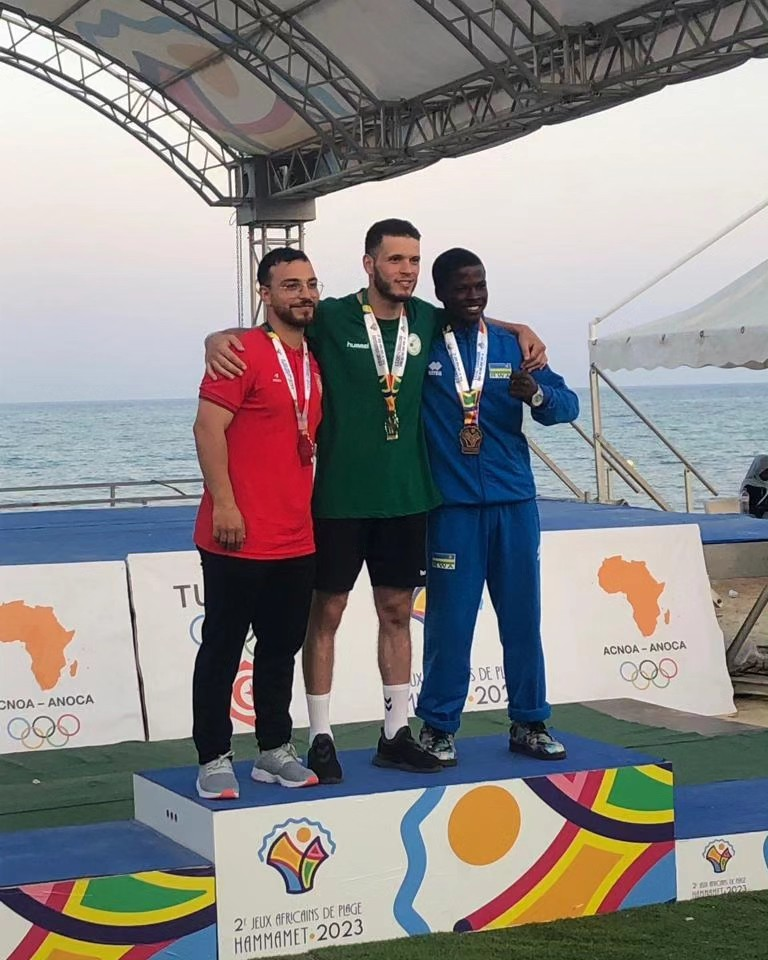
Reflecting on Wushu in Rwanda and Africa
We asked Emmanuel about his thoughts on wushu’s development in his region, East Africa, and in the overall continent of Africa. He told us, “The development of wushu in East Africa, particularly in Rwanda, is growing at a steady pace, with significant strides made in promoting the sport within schools, media, and the broader community. Wushu in Rwanda has a solid foundation, and we are taking steps to ensure its growth and visibility, especially when comparing it to other regions in Africa. However, when comparing it to West, North, or South Africa, wushu is more established in some of these regions, where dedicated training centers and competitions are more frequent. Despite this, East Africa, and Rwanda in particular, is catching up, with a clear roadmap for the future of the sport.”
“What unifies wushu across Africa,” Emmanuel says, “is its shared culture of discipline, respect, and martial prowess, and the desire to promote this sport as both a physical and mental pursuit. The sport’s global appeal is growing, and as Africa's interest in martial arts expands, wushu is poised to become a unifying force, bringing people together through training, competition, and community events.”
“Regarding the future of wushu in Rwanda,” he continues, “we are excited about the direction it’s heading. One of the key initiatives is the "Imbarutso Project," a project designed to introduce and expand wushu training in schools across the country. By engaging young people and integrating wushu into school curriculums, we aim to create a new generation of skilled athletes. Additionally, the Rwanda Kung-Fu Wushu Federation is actively promoting the sport through various media platforms. The Rwanda Kung Fu Wushu Federation’s YouTube channel is one such avenue, where we post updates on events, competitions, and training to keep the public informed.”
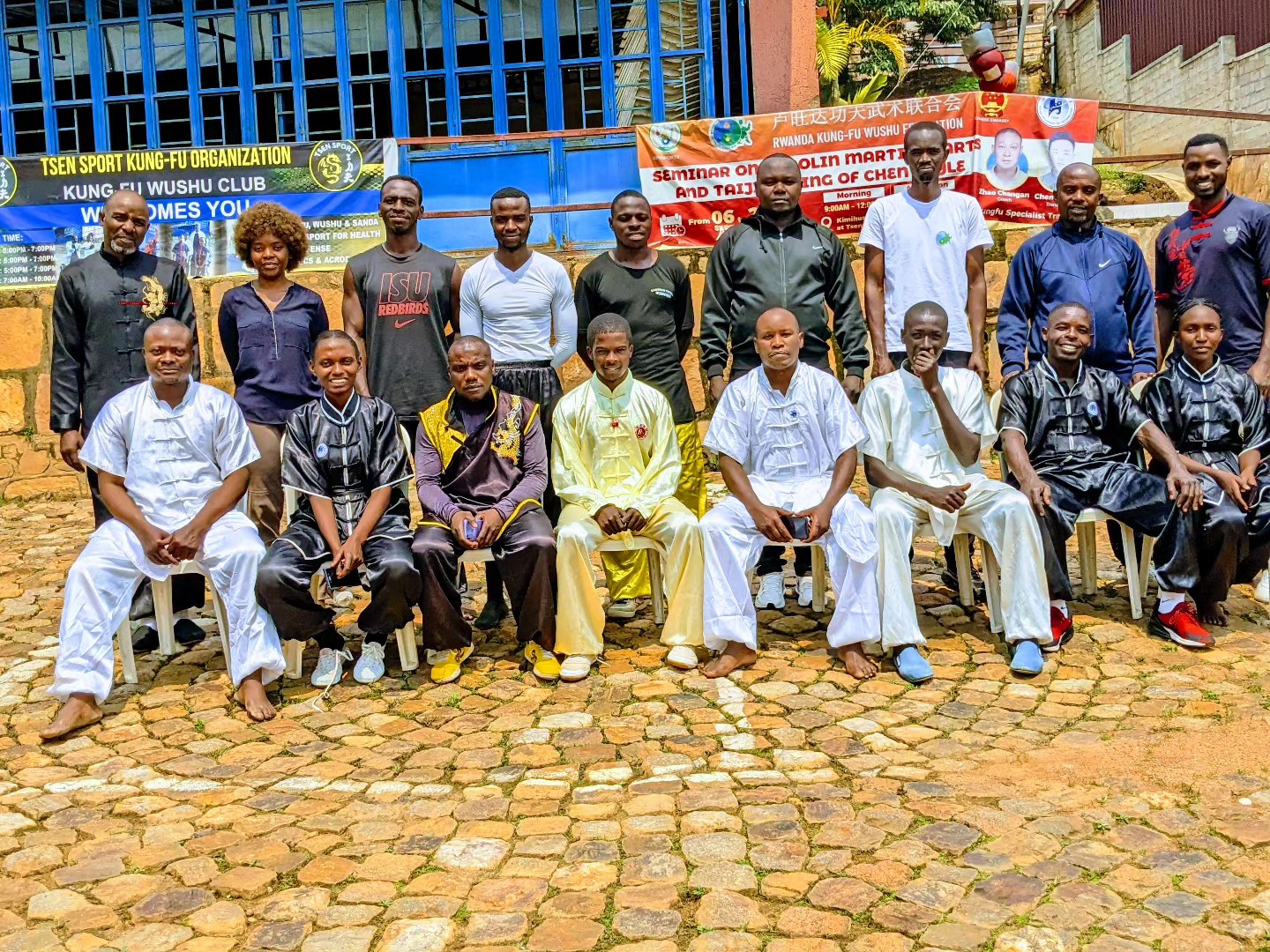
“Moreover,” Emmanuel adds, “Rwanda hosts events like the "Car Free Day Sport," which takes place twice a month, where we participate in public activities like jogging and group fitness. During these events, we also showcase kungfu through performances and demonstrations, attracting interest and generating awareness. This is a powerful way to engage with the public and promote kungfu as both a sport and a cultural practice.”
“Looking ahead, I am optimistic about the future of wushu in Rwanda. With growing media presence, school initiatives like the Imbarutso Project, and regular community engagement, the sport has the potential to become a significant part of Rwanda’s cultural and athletic identity. As the sport continues to grow, I believe that wushu will soon be recognized as one of the leading martial arts disciplines in East Africa.”
Wushu in Africa – 2026 Dakar Youth Olympic Games
Reflecting on the upcoming Youth Olympic Games in Dakar, Emmanuel says, “The inclusion of wushu in the 2026 Dakar Youth Olympic Games is a monumental step for the sport in Africa. This recognition at such a prestigious international event will undoubtedly raise the profile of wushu, not only in Africa but globally. It provides a unique opportunity to showcase the discipline, skills, and cultural heritage behind wushu, which can lead to greater recognition and respect for the sport.”
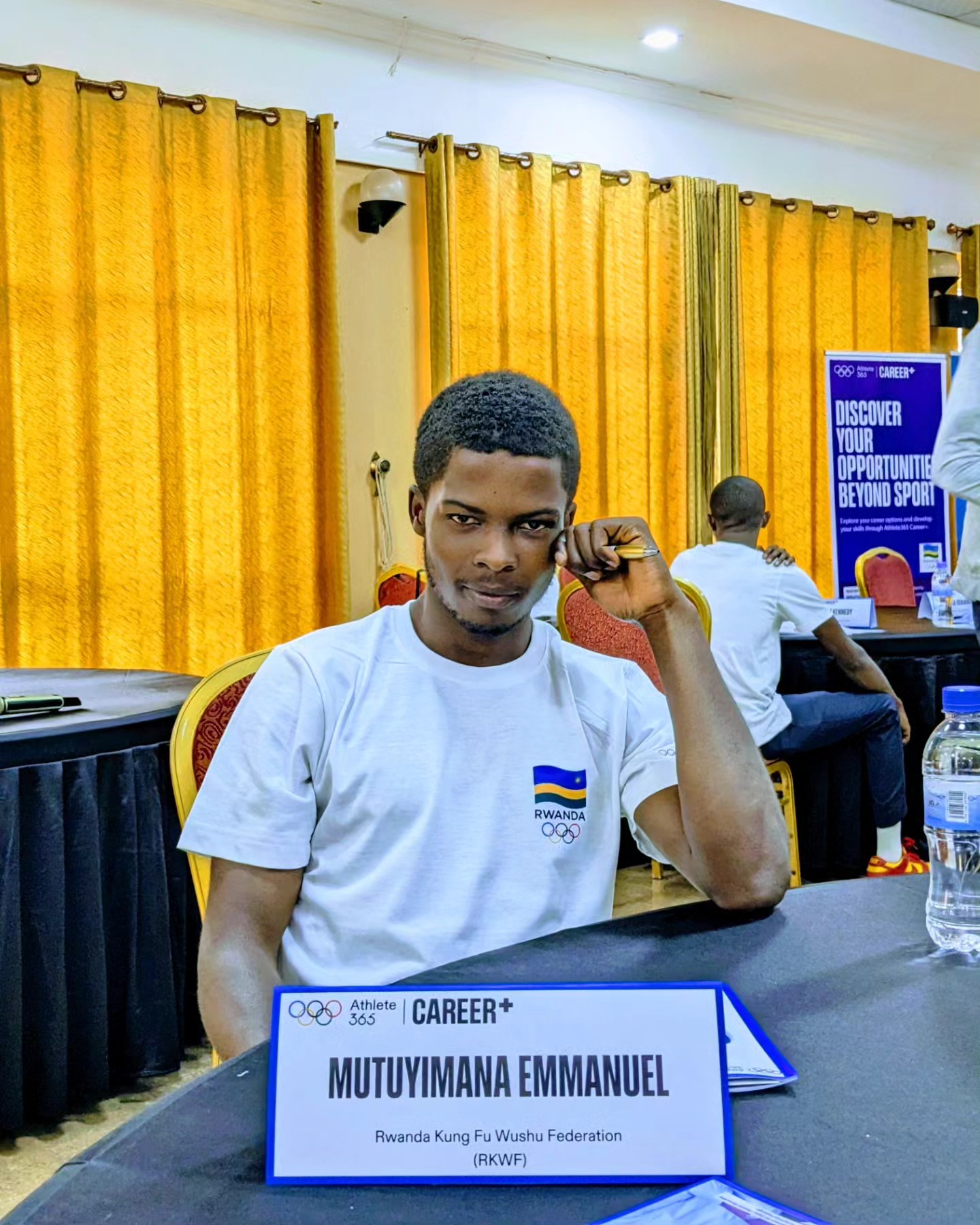
“For Africa, this inclusion opens up new avenues for development. It can inspire young athletes across the continent to take up wushu, knowing that they now have a platform to compete at the highest level. The Youth Olympic Games will attract attention from governments, sports organizations, and potential sponsors, leading to increased investment in training facilities, coaches, and competitions. This, in turn, will improve the overall quality and accessibility of wushu in Africa.”
“I believe the 2026 Youth Olympic Games will create a ripple effect, where young athletes, especially in countries like Rwanda, will be motivated to pursue wushu with more dedication and ambition. This recognition can also help to formalize the sport in many African countries, encouraging schools and sports clubs to adopt wushu as part of their curricula and programs. Ultimately the Games will serve as a catalyst for the growth and promotion of wushu in Africa, helping it gain the recognition it truly deserves while inspiring a new generation of athletes.”
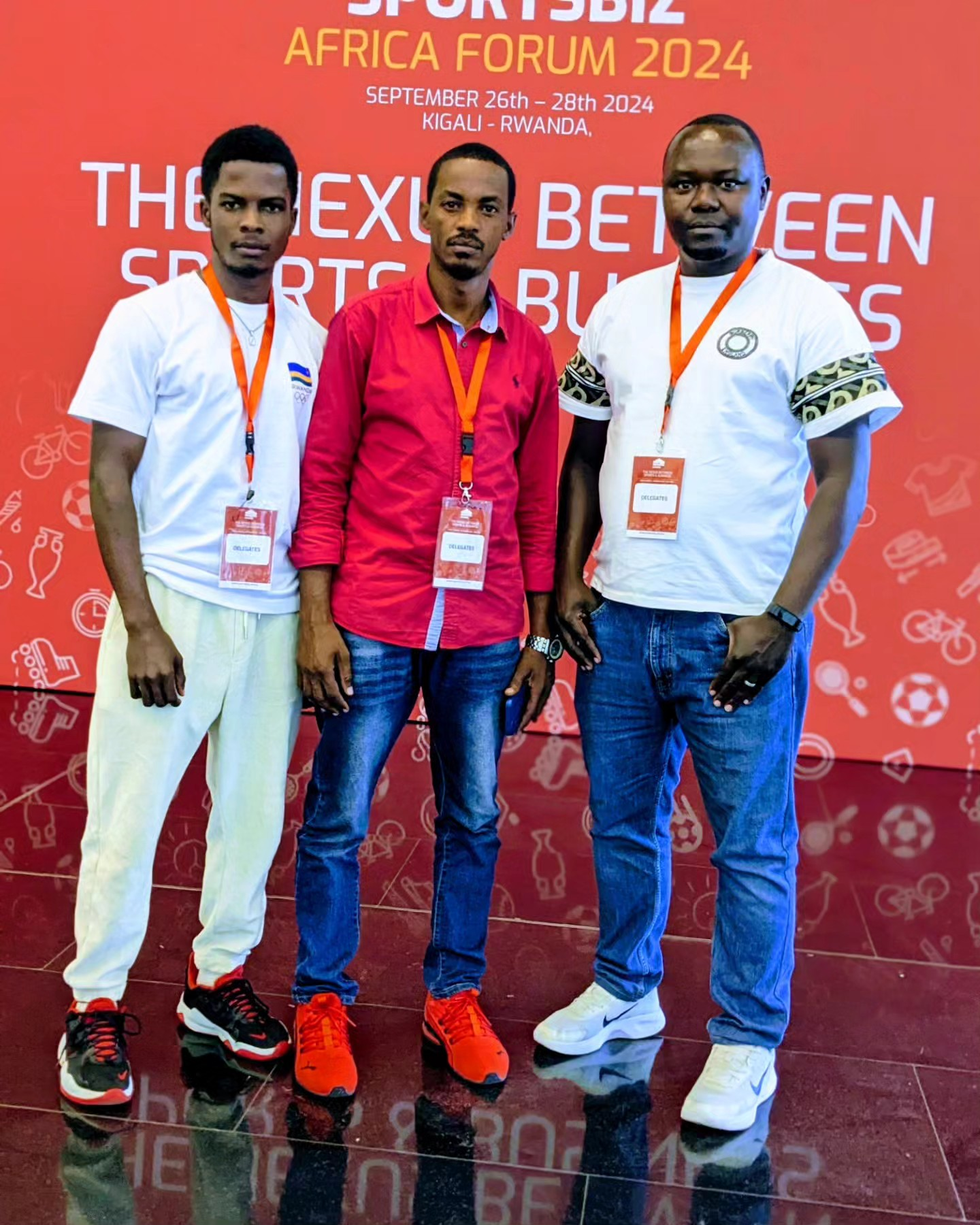
Promoting Wushu in Africa on Social Media
Being a Gen Z digital native, Emmanuel is no stranger to the power of social media promotion, which he is using to help grow wushu in Rwanda and Africa. He helps run the social media of his school, highlighting its ethos: “Kigali Kungfu Shaolin Temple encourages you to have a better life through sports.” This is also reflected in his own social media channels.
“In terms of social media,” he says, “my personal strategy to promote wushu includes platforms like TikTok, Instagram, and my YouTube channel. These platforms allow me to showcase the beauty and discipline of kungfu, reaching a wider audience, and inspiring others to join the sport. By sharing training videos, competitions, and tutorials, I aim to make wushu more accessible and appealing, especially to the younger generation.”
Emmanuel has created his own successful Youtube channel, which he runs under the name “Jing Wu Fils.” He explains, “The name ‘Jing Wu’ was inspired by a Chinese actor and martial artist I admired,” says Emmanuel. “I grew up watching Chinese movies and was particularly drawn to a fighter in one of the films named Jing Wu. I liked not only his acting skills but also his dedication to wushu and kungfu, which really motivated me. I started watching his performances on YouTube and was fascinated by his mastery of martial arts. He became a role model for me, and I decided to adopt the name ‘Jing Wu’ as part of my own identity. I added my own last name to create ‘Jing Wu Fils,’ which I then used as the name for my YouTube channel.”
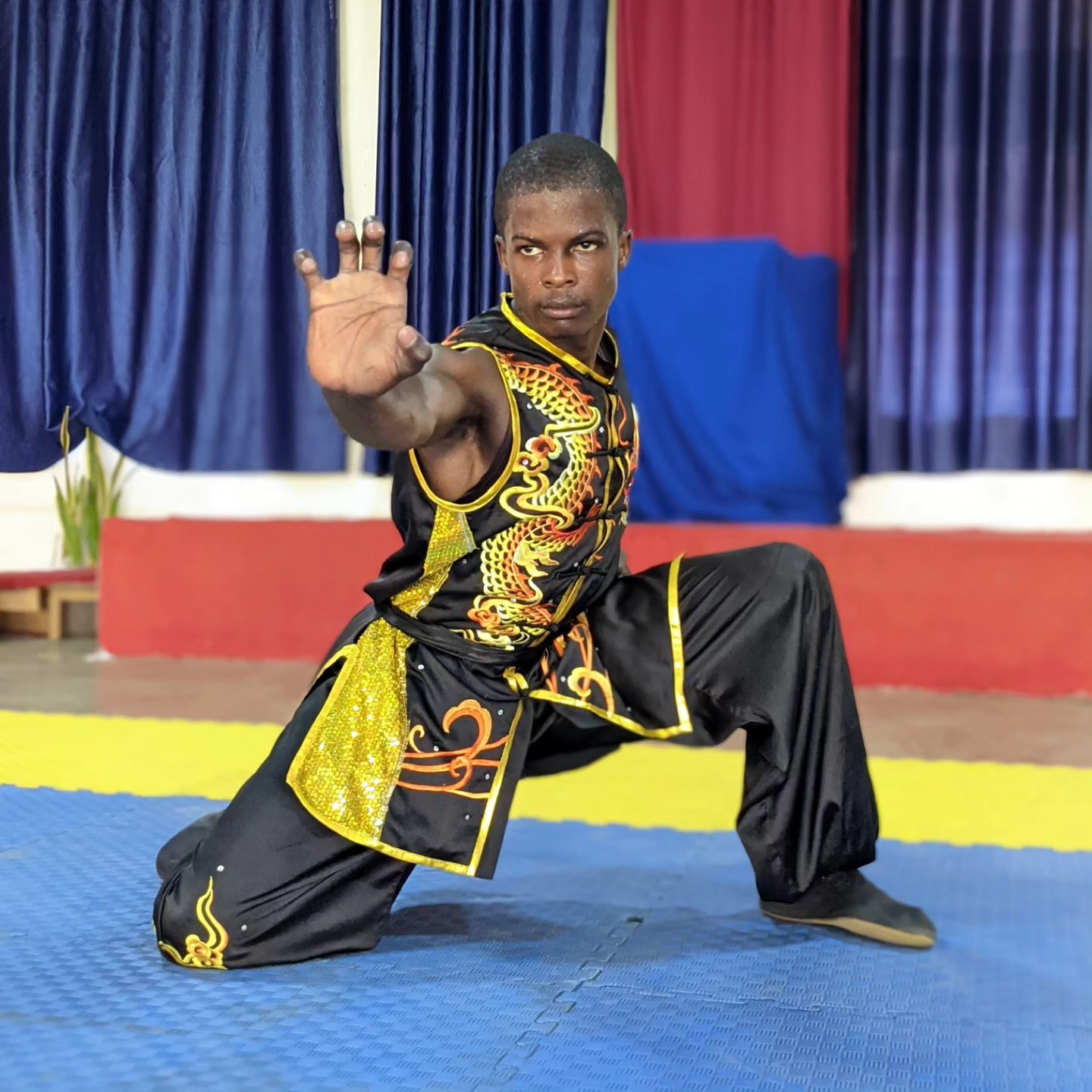
He adds, “Through my YouTube channel, I share my journey as a wushu athlete and coach. It’s a platform where I post training tips, performance videos, and insights on wushu, kungfu, and the martial arts world in general. My goal is to inspire and educate others who are passionate about martial arts and to connect with a global community. The channel allows me to spread the values of discipline, perseverance, and respect that are central to wushu, and it’s a great way to stay connected with others who share the same love for the sport. Ultimately, my YouTube channel reflects my passion for martial arts and my desire to influence and encourage others to follow their own paths in the martial arts world.”
Family, Work and Balance
“My family has been very supportive of my wushu journey,” says Emmanuel. “They take pride in the dedication and discipline I bring to the sport, especially after I won a bronze medal at the African Beach Games and represented my country at the International Wushu Invitational Tournament in Jiangyin, China. These accomplishments have brought honor to our family and inspired them to see wushu as more than just a sport but also a path to success and personal growth.”
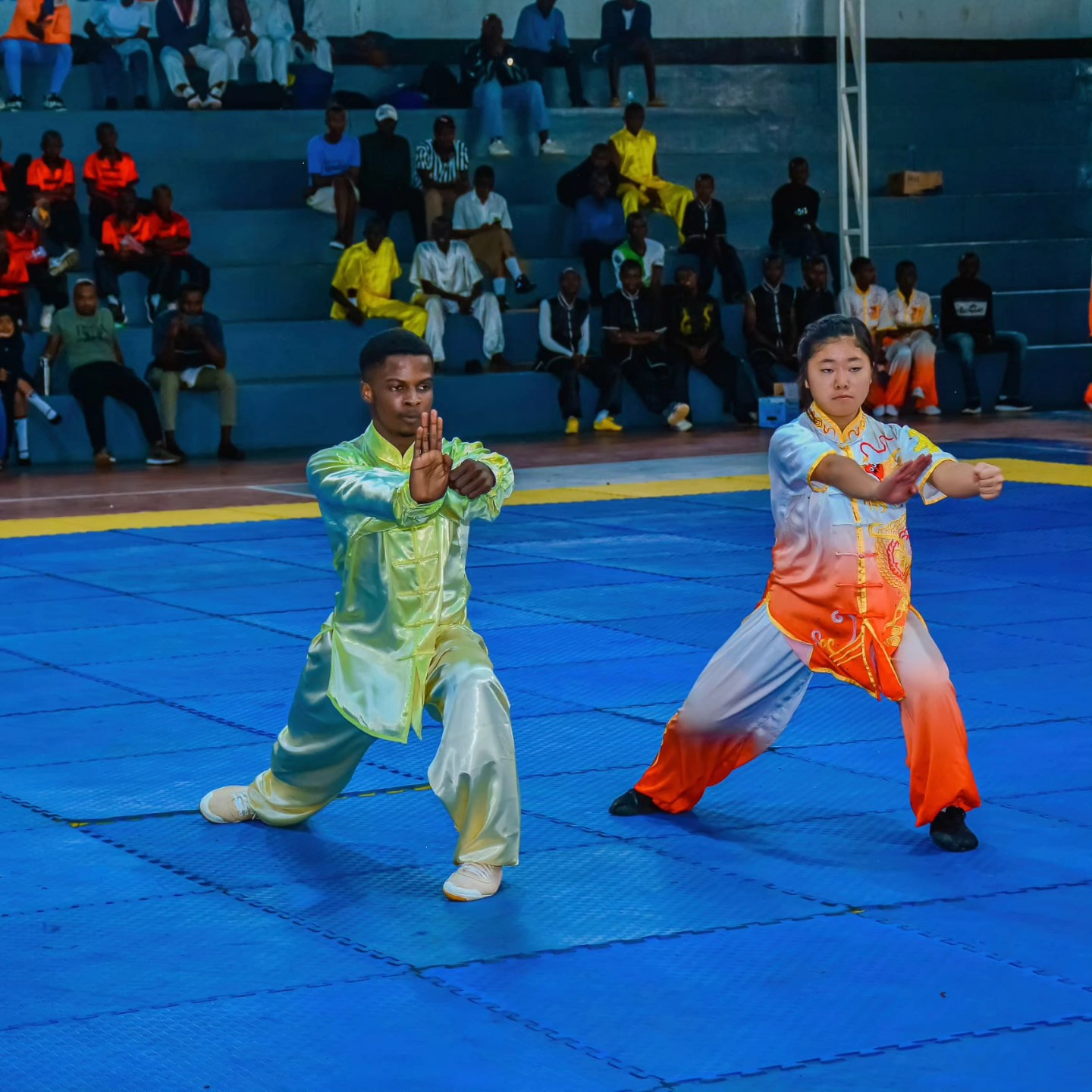
Outside of wushu, Emmanuel works as a personal kungfu coach, offering private training sessions to individuals. “This flexibility,” he says, “allows me to balance my coaching commitments with my personal training and competition preparation and stay connected to the martial arts community, and it also helps me refine my own skills as I teach others. I also have a keen interest in Forex trading, where I spend time learning about market trends and developing strategies for better risk management. Additionally, I am passionate about learning languages—currently I’m focusing on Mandarin for my kungfu competitions and Arabic for personal growth. Balancing my wushu training with these activities requires effective time management. I prioritize my commitments by setting goals and using a flexible approach when adjustments are needed.”
Wushu Philosophy & Future Goals
“My future goals in wushu are focused on both personal and professional growth,” says Emmanuel, looking ahead. “In the short term, I am committed to enhancing my techniques and preparing for top-tier international competitions. In the long term, my ambition is to reach the pinnacle of the sport, striving for world championships and international recognition. Beyond individual success, I aspire to leave a legacy as a coach and mentor, and through teaching and guiding others, I hope to contribute to the growth and global recognition of wushu.”
Wushu has profoundly shaped my life,” concludes Emmanuel. “Not only as a physical discipline but as a guiding philosophy. It has taught me the importance of consistency, resilience, and respect in all aspects of life. My approach to wushu is about balance—honoring its traditional roots while embracing innovation and continuous growth. The purpose of my journey in wushu started as a personal pursuit of discipline, but over time it transformed into a mission to share its values and techniques with others, ensuring its legacy continues to inspire future generations.”
